




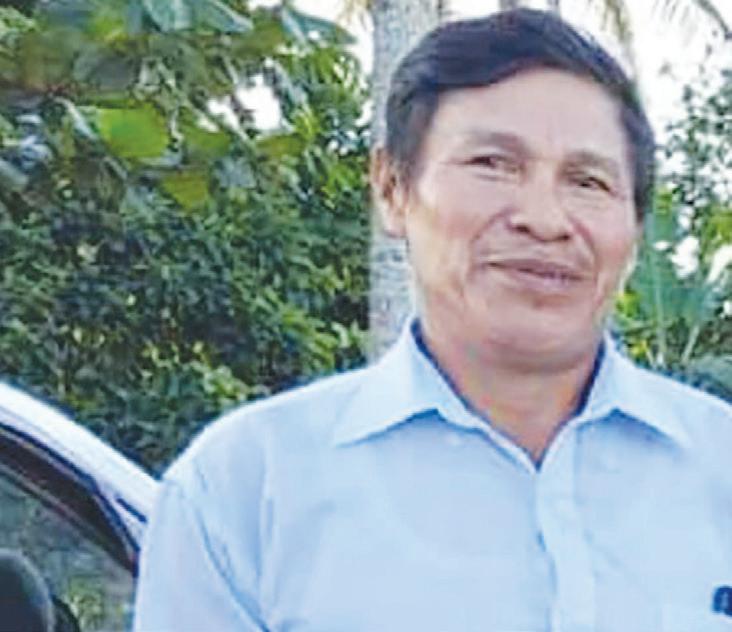

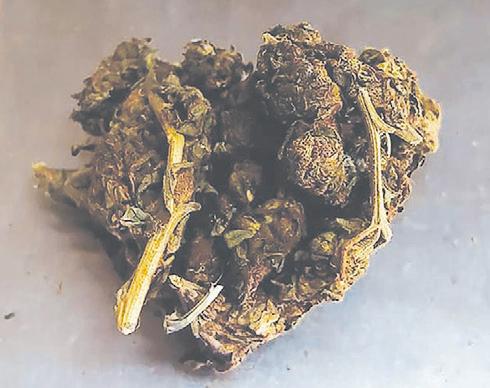

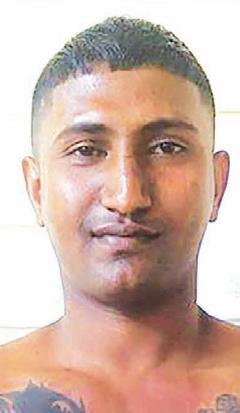

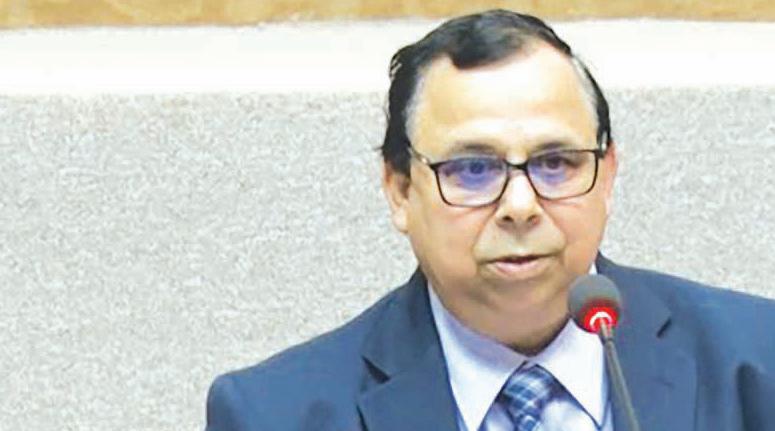
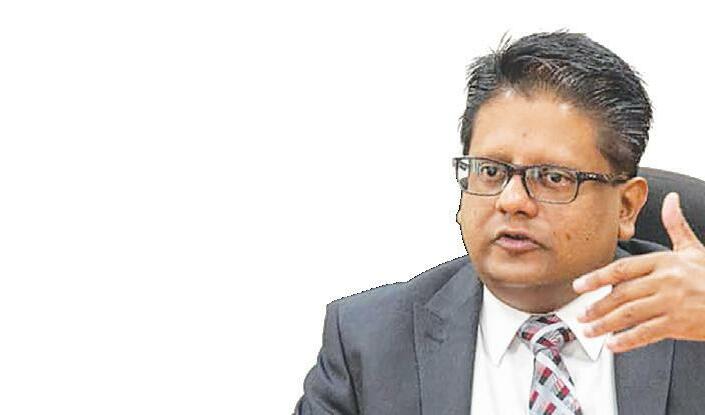


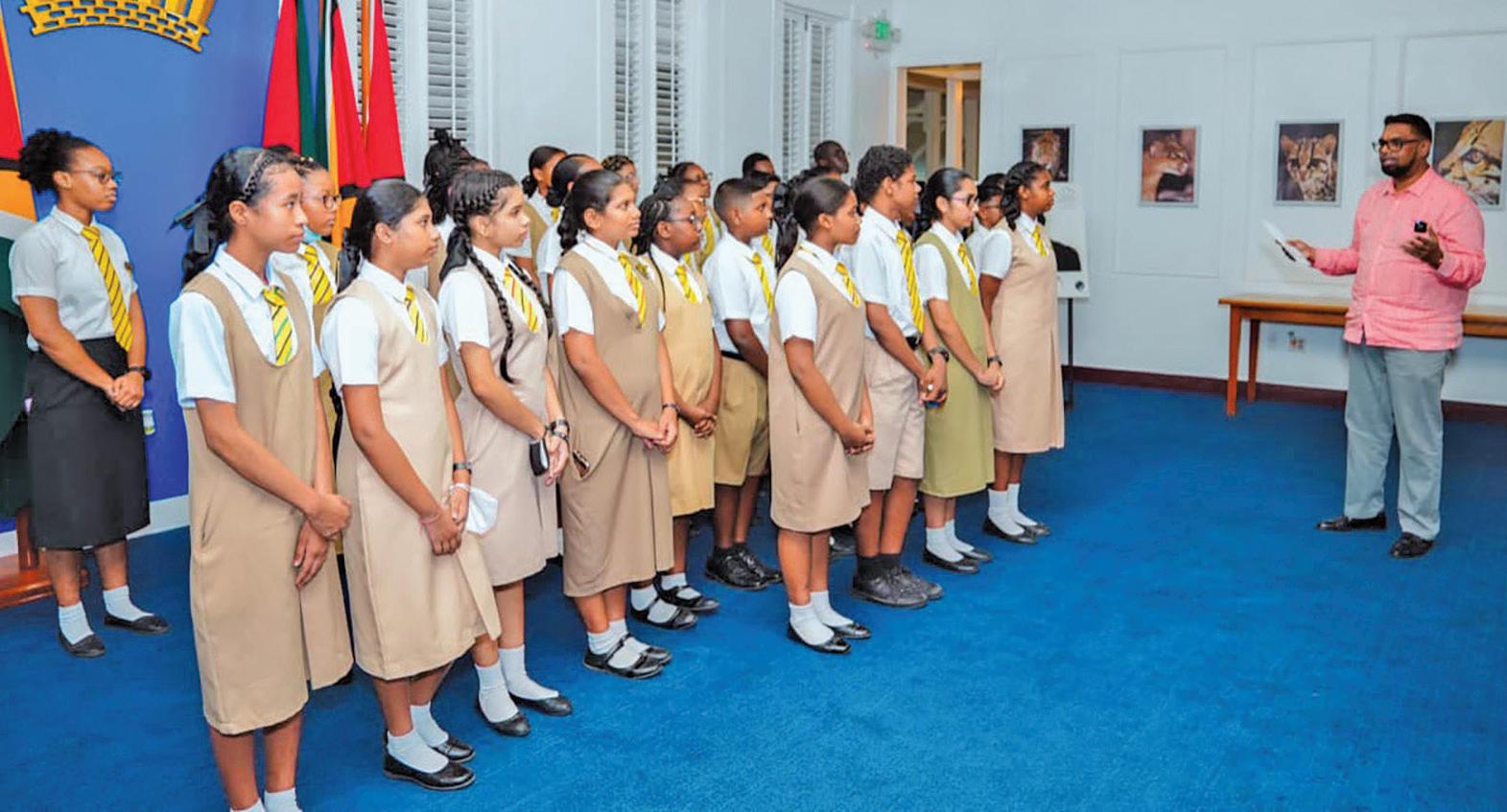




















Ranks in Regional Division One (Barima-Waini) have launched an investigation surrounding the death of a pastor following a boat accident in Moruca River.
Dead is Rudolph Henry of Parakeese Village, North
West District.
The incident occurred at about 13:30h on Friday.
Reports are that the pastor, who is also a boat captain, died after the boat he was sailing along the Moruca River, collided with another boat that was driv-
en by a 31-year-old businesswoman of Chinese Landing, Barama River, North West District (NWD).
Police said that enquiries revealed that the businesswoman was driving her boat in the vicinity of Mora Village in the Moruca River,
heading to Chinese Landing, when the two boats collided.
Henry, 53, who received injuries, was pulled from the river and rushed to the Kumaka District Hospital, where he was later pronounced dead.
The man’s body is currently at the Moruca morgue awaiting a post-mortem examination, as Police continue their investigation.
Last Monday, two children, five-year-old Reshanna Atkinson and one-year-old Josiah Atkinson, fell overboard after the boat in which they were travelling capsized in the Pomeroon River.
According to information received, the children, along with their par-


ents, Bhinauth and Novita Atkinson, were in a boat in St Monica heading home
when the boat engine, a 75-horsepower Yamaha, collided with a floating object in the river.
As a result, the boat flipped and capsized, causing the family to fall into the water.
However, Bhinauth and Novita managed to swim to shore while the children went missing.
Their bodies were later recovered.
Meanwhile, according to Regional Commander Khemraj Shivbaran, the family members did not have on life jackets. He also said, at the time they were travelling, they were using a cell phone flashlight in order to see clearly. (G9)
the eastern grass parapet, where it collided with a bridge and crashed into a fence, resulting in an impact that caused its driver and occupants to sustain bodily injuries.
The car was being driven by a firewoman stationed at the New Amsterdam Fire Station; she is a resident of East Canefield Settlement in East Canje, Berbice.

Two-year-old Jasmine Ross of Angoy's Avenue, New Amsterdam Berbice is now dead following an accident that occurred on Friday afternoon at about 15:00h at Cumberland Village, East Canje, Region Six (East Berbice-Corentyne).
Reports are that motorcar PGG 278 was proceeding north along the western lane at a fast rate of speed when the driver lost control
of the vehicle and it skidded onto the eastern lane and collided with motorcycle MR-1, which was proceeding in the opposite direction.
As a result of the impact, 29-year-old motorcyclist Marley Ross and the toddler, who was the pillion rider, were both flung into the air, and fell injured onto the eastern grass parapet.
The car continued skidding, and ended up onto
Jasmine Ross was pronounced dead on arrival at the New Amsterdam Public Hospital, while motorcyclist Marley Ross and occupants of the car Javeer Blair, five, and Shavine Laundry, 11, were examined by the doctor on duty and were referred to the Georgetown Public Hospital for further treatment.
The 28-year-old firewoman, who failed a breathalyzer test, was arrested, the Police have said. An investigation has been launched. (G4)

The Demerara Harbour Bridge will be closed to vehicular traffic on: Saturday, Dec 24 – 05:30 – 06:30h and Sunday, Dec 25 – 04:30h – 06:00h.
The Berbice Bridge will be closed to vehicular traffic on:
Saturday, Dec 24 – 17:00h – 18:30h and Sunday, Dec 25 – 05:45h – 07:15h.











Parika and Supenaam departure times – 05:00h, 10:00h-12:00h, 16:00h, 18:30h daily.


There will be sunshine during the day. Expect partly cloudy skies at night. Temperatures should range between 20 degrees Celsius and 29 degrees Celsius.

Winds: East North-Easterly to Northerly between 1.34 metres and 4.91 metres.
High Tide: 17:14h reaching a maximum height of 2.8 metres.

Low
President Dr Irfaan Ali has praised the strong friendship between Guyana and Cuba, noting that the Spanish-speaking nation has made “huge contributions” to the development of Guyana and its people especially in the area of healthcare.
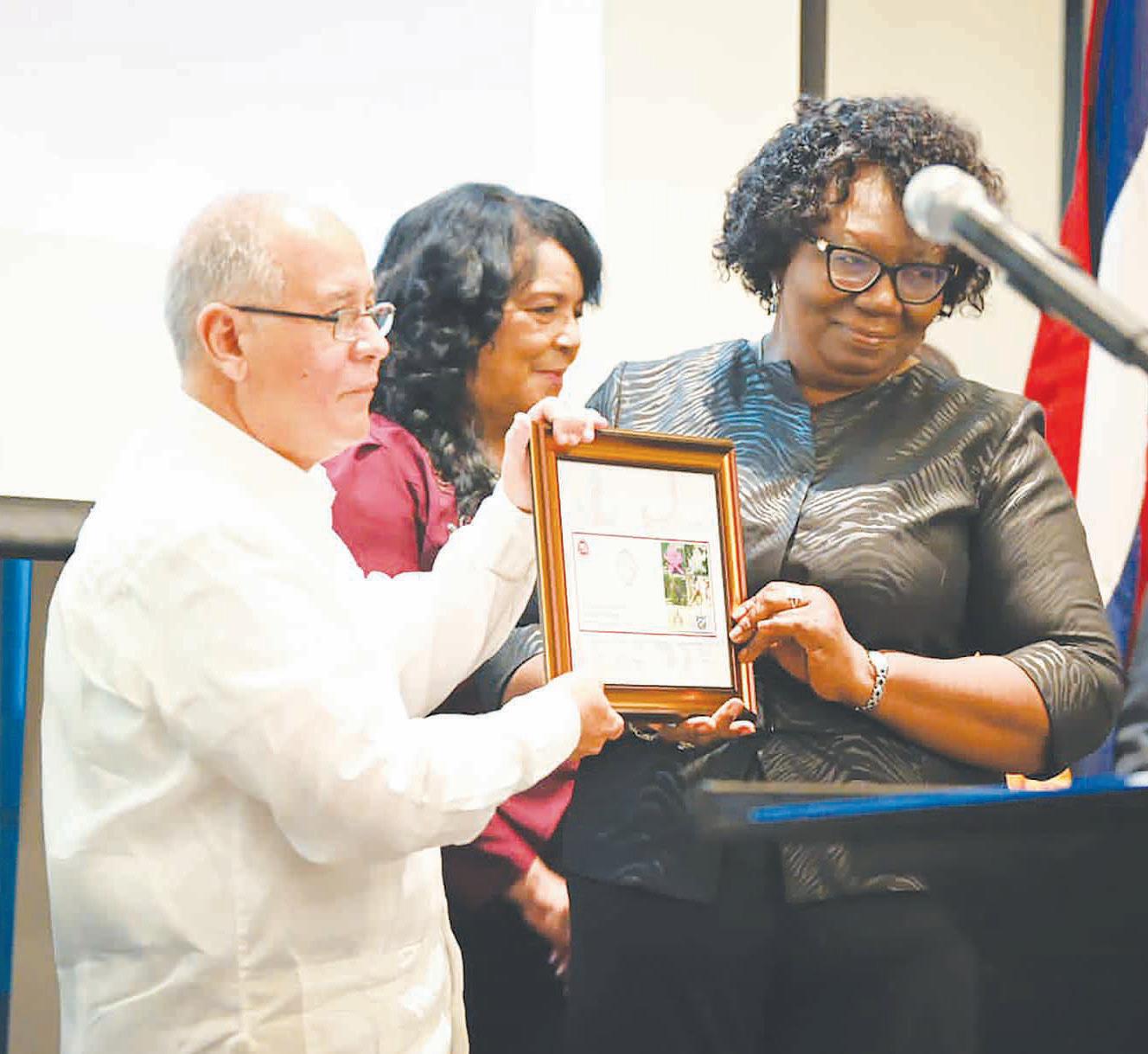
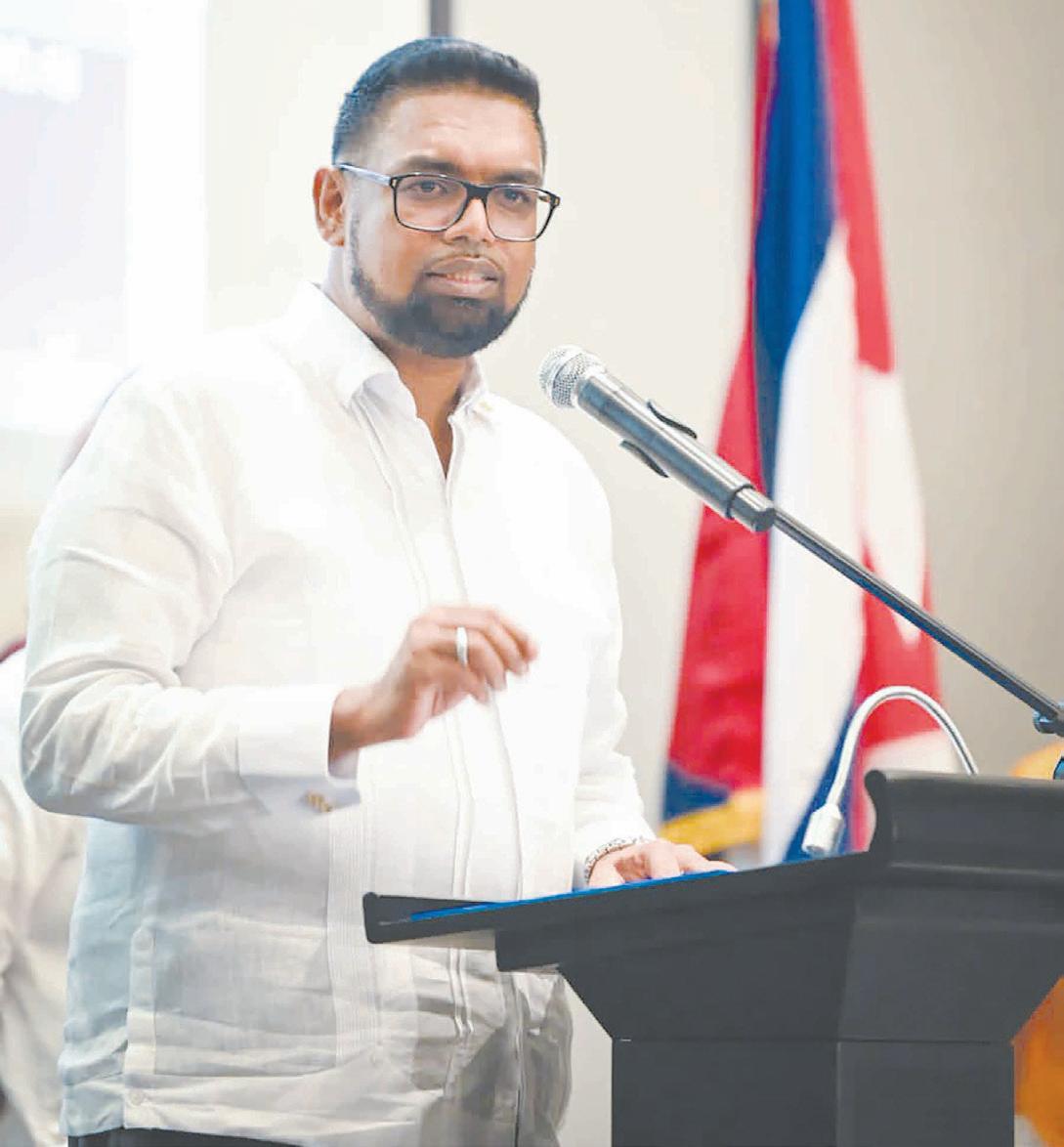
The Head of State made these remarks at a reception held on Thursday evening to commemorate the 50th anniversary of the establishment of bilateral relations between the two countries. There was a small gathering at the Pegasus Suites and Corporate Centre in Georgetown, where the event was held.
But according to President Ali, the presence of the small crowd is in no way reflective of the “huge contributions” Cuba has
who are committed to ensuring that they do their bit to making the world a better place,” the Guyanese leader posited.

He went on to talk about Cuba’s commitment to humanity, reminding that the country deployed much-needed nurses and doctors to regions across the world to aid in their fight against the COVID-19 pandemic. This, the President pointed out, was done at a time when Cuba is being faced with discriminatory treatment when compared to the rest of the countries in the Latin America and Caribbean Region.
In fact, it was outlined that Cuba has always been a faithful friend to the Caribbean Community
in the transmission of our healthcare sector… Our relationship with Cuba is based on shared goals and aspirations for our people. It is based on certain values and principles. We support, firmly, every environment in which the prosperity, honour, dignity and pride of the people is foremost in what we do. This is important for advancing the cause of humanity,” he added.
It is for this reason, the Guyanese leader explained, that Guyana has consistently stood with Cuba at international forums such as the United Nations, where it not only denounced the blockade by the United States onto Cuba but also called for the full removal of the sanctions.
of peace.”
“Today, as we celebrate 50 years of strong friendship, on behalf of the Government and people of Guyana I wish the President, Government and people of Cuba the best of health, prosperity and success. I wish to reassure the Cuban people that in Guyana, lies a true, faithful and strong friend,” the President declared.
Guyana and Cuba established diplomatic relations on December 8, 1972. A commemorative stamp to mark the celebration of the 50th anniversary of diplomatic relations between the two nations was also unveiled at the reception.
made to the development of Guyana with the training of professionals in the medical and engineering fields.

“When we think about our healthcare system and the thousands of doctors and nurses that benefited from training in Cuba; when we think about our engineering system; when we think about the medical brigades that came to support our health sector; when we think about the selfless sacrifice of sharing even when Cuba itself had limited resources, it tells us about a people who are committed to the cause of humanity, a people who are committed to the upliftment of humanity, a people
(Caricom) and continues to be a top destination for leaders in the LAC Region to seek medical treatment.
“This tells you something about the character of the people themselves… [and their] interest in humanity. Cuba has shown us that if we put humanity at the centre of what we do, we can achieve great things,” President Ali stated.
Nevertheless, the Head of State contended that Guyana will continue to maintain its strong, solid, respectful and dignified relationship with Cuba.
“Cuba indeed has played an integral part and continues to play an integral part

More recently, he added, Guyana endorsed a Caricom statement which asked that Cuba be removed from a list of terrorist countries
“As we forge ahead, we must find a place in this world where everyone can be accommodated, where we can be around a table and talk issues out. We must find a place in this world where different views can be tolerated and where ideas can be developed through proper consultation and dialogue. There is no replacement for dialogue in the building of peace. This Region we are so proud of must remain a zone of peace and we value the importance of dialogue in keeping this Region a zone
Cuba’s Ambassador to Guyana, Narciso Reinaldo Amador Socorro, thanked the Guyana Government for commemorating the bilateral relationship with the issuance of the stamp, which displays the respective national symbols of both nations.
According to Ambassador Socorro, the feeling of mutual respect and friendship of solidarity between the two countries date back many years, when Guyana along with three other Caricom nations decided to establish ties with Cuba thus breaking the diplomatic siege which the country had been subjected to.
…as two countries celebrate 50 years of diplomatic
Editor: Tusika Martin
News Hotline: 231-8063 Editorial: 231-0544, 223-7230, 223-7231, 225-7761
Marketing: 231-8064 Accounts: 225-6707
Mailing address: Queens Atlantic Investment Estate Industrial Site, Ruimveldt, Georgetown

Email: news@guyanatimesgy.com, marketing@guyanatimesgy.com

Social media is a world within a world, and for those who were born in the 21st century, technology is only but a natural phenomenon. Cell phones, iPods and video games are practically inevitable for teens and young adults.
Platforms such as Facebook, TikTok, Twitter, Instagram, and Snapchat have taken by storm the world in general and youths in particular. They have connected the seven billion people of the earth like at no previous time since Homo Sapiens took over from the Neanderthals. Intended to increase connectivity between persons on the heels of the internet, they have, however, morphed to create changes in their users – especially youths – that might not have been predicted.
While these sites’ open dialogue allows individuals to express themselves, there must be some amount of user censorship, not necessarily by the domain host, but rather by individuals themselves. Creating a profile and giving details about yourself, hobbies and educational background are all acceptable; however, for many, every aspect of their day, work and lives is posted. Like driving, the users of social media should be cognisant of the five Cs – caution, care, common sense, courtesy and consideration – as many of the things posted can arise in the future to haunt thrones.
From studies conducted, it is clear that young people find social media addictive, and they spend vast amounts of their time on it every day of their lives. “Scientists have found that teen social media overuse creates a stimulation pattern similar to the pattern created by other addictive behaviours. Hence, the brain responds to social media the same way it responds to other “rewards” — with a release of dopamine. These dopamine rushes are catalysed when a teen posts something online and is met with likes, shares, and positive comments from their peers.” Most parents are unaware of the amount of time their very young children spend on social media, but may observe the effects.
Social media certainly has its benefits for youths, since it is at this stage in life they are learning to form relationships. “According to a report released in 2021 by Common Sense Media on social media’s effects on teens, about half of the 1,500 young people surveyed said social media is very important for them in order to get support and advice, feel less alone, and express themselves creatively, as well as for staying in touch with friends and family while social distancing. And 43 percent said that using social media makes them feel better when they are depressed, stressed, or anxious. Among LGBTQ youth, 52 percent said social media helps them feel better when they are experiencing these difficult emotions.”
But social media also has its downside for youths, and researchers at Facebook – which owns Instagram – found that the latter negatively affects their mental health. “They found that 13% of British teen Instagram users and 6% of American users in the same age segment thought about committing suicide while attributing such self-destructive feelings to the site.” But even against that background, when Facebook owner Mark Zuckerburg was questioned about the subject in a Congressional hearing, he insisted that such statistics were “misleading”. Unfortunately, there are no such studies in Guyana, but the dynamics are the same as should be the effects.
The negative and suicidal thoughts arise out of the operation of platforms like Instagram, that are dominated by individuals and “influencers” who post pictures of themselves that have been heavily photoshopped and airbrushed, to present images that are very unrealistic in comparison to the looks of average youths. All of these create tremendous pressures on youths to achieve that perfection, especially when it comes to looks and lifestyle. When they compare themselves, they despair at the gap, and feelings of inadequacy set in, which in turn leads to depressive and suicidal thoughts.
Overall, social media has its positives and negatives, but it is clear that there has to be more examination to ensure that the latter does not create a public health crisis in youths. For now, maybe parents should pay more attention as to where their children’s minds are at when they have that ubiquitous smartphone in their hands.
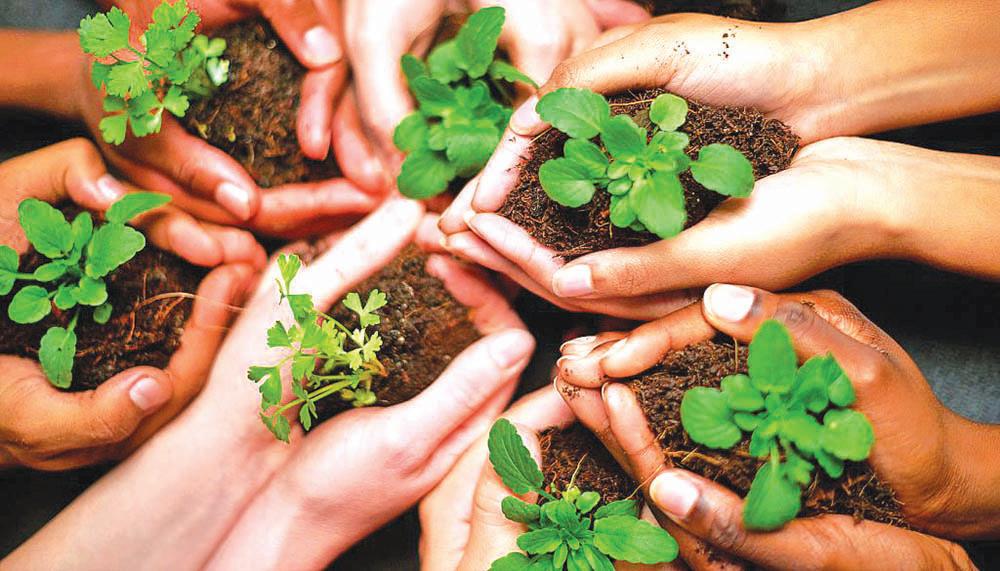
 By Inger AshIng
By Inger AshIng
About a year ago, 12-year-old Asaad was enjoying being able to go to school and play with friends again in Sudan, following months of uncertainty brought on by the COVID-19 pandemic. But he did not have long before the next crisis hit. Heavy rains and extreme flooding washed away his home and inundated his neighbourhood, forcing his family and many others to flee.
Asaad, now 13, is among at least 10 million children in the world who have been displaced as a result of climate change. He and his family ended up in Egypt, and I had the honour of meeting him along with other inspirational children whom Save the Children supported to attend COP27 in Sharm elSheikh last month. His story shows firsthand how the climate crisis is a child rights’ crisis, and he spoke so impressively about the need for leaders to factor children’s rights into their decision-making – something that was agreed upon at this year’s COP for the first time in history.
Like many of the children I meet, Asaad’s experience, his courage, and his determination to push for a change reminded me of why I began campaigning for the rights of socially-excluded children as a young person. The daughter of a Swedish mother and an Asian father, I was raised in a largely migrant area of
Sweden, where our rights and demands were often dismissed offhand. Asaad reminded me of why we at Save the Children do the work we do.
The year 2023 marks the halfway point of the Sustainable Development Goals (SDGs) agreed upon in New York seven years ago. This moment seems a good one to reflect on where we are.
ing. In a ground-breaking survey of more than 54,000 children we carried out earlier this year, 83 percent of children in 15 countries said they see the climate crisis, or inequality, or both affecting their surroundings, while 73 percent of children believe adults should be doing more to address these issues.
Data collected for the same report shows that one-third of the world’s children – an
Children already affected by poverty and discrimination are the most vulnerable. They and their families have the least power to demand change, particularly compared with powerful companies and countries that may be benefitting from the status quo. Likewise, this inequality and discrimination erode their resilience to shocks.
We need to see urgent humanitarian, development, and climate financing, and critical reforms to the international financing system to make it work better for lower-income countries.
Children are still bearing the brunt of the world’s ills, which they have done nothing to contribute to. The world took one step out of the COVID-19 pandemic and its fallout that saw an unprecedented economic downturn and reversal of historic gains in healthcare and education, only to hurtle into the worst global cost-of-living crisis in a generation.
Children should have emerged from the stress of the pandemic to a safety net that would help them survive, learn, and be protected. Instead, they tell us they are unable to go to school, play with their friends, or eat enough to keep them go-
estimated 774 million – are living with the dual effects of poverty and high climate risk.
Meanwhile, the number of children living in countries with the deadliest conflicts increased by 10 percent this year, according to another Save the Children report.
The UN’s Global Humanitarian Overview for 2023 finds that one in every 23 people would need humanitarian assistance to survive next year. This is a staggering 24 percent increase from a year ago, and we know that it is children who are the most affected by humanitarian crises.
We owe it to children like Asaad to fight harder. When I was growing up, teachers would say that my views did not matter, and that I would only end up unemployed and on social benefits. But all this only lit a fire in me to stand up for myself and other children – and I have carried that to this day.
Children can, and do, make a difference. Children must have their views and recommendations heard, from the streets to the corridors of power. The outcome of COP27 shows that this can be influential. Let us put children and their rights at the centre of creating a greener and more just planet, and support them to be part of the change the world so desperately needs. (Al Jazeera)
(Inger Ashing is the Chief Executive Officer (CEO) of Save the Children International)

Dear Editor, Guyana is, no doubt, going through a massive economic transformation. Transformation is different from change in the same way that a change in demand is different from a change in the quantity demanded. Cereal, instead of roti.

We are in the midst of a paradigmatic revolution in terms of the economic structure and attendant effects, such as the composition of the gross domestic product, national income, job opportunities, the structure and distribution of incomes, consumption patterns, the gender configuration of the labour force; and, inter alia, the dynamics of the labour market, with increasing emphasis on migrant or remigrant labour.
Practically all of the developments above are progressive; or, at a minimum, heading in the right direction. There is, however, one seriously lagging component, namely: our culture.
Allow me to get to the basics by listing some areas of national and institutional culture that must go through if Guyana is to get to the bare minimum
for success in a highly globalised world economy.
First and foremost, as it stands, breaking rules is so widespread that it is the norm. Where rule-breaking is concerned, there seems to be perfect equality across the spectrum of ethnicity, geography, politics, and religious persuasion. While there are regular expressions of outrage against rule-breaking, all too often, the prescribed solution is enforcement.

But rule enforcement by state authorities should not be the principal method of eliciting proper conduct and compliance. What is needed is systematic and systemic resocialisation of individuals into functioning citizenship, beginning with the family. Religious practices perhaps need to become a bit more secular, and address problems of everyday life rather than focus on the principles of abstract salvation and deliverance. Educational institutions need to go beyond exam preparation and inculcate a culture of reciprocal obligation in a new regime of norms. No disrespect intended.
Leaders in civil society have a special responsi -

bility to provide guidance, and, through their own conduct, set new standards of good citizenship. When civil society groups become too attached to political parties, or themselves act like political parties, they abandon a ‘sacred space’ to which they are entitled through what might be called constructive abstinence.
I do not mean the type of abstinence that US President George W. Bush meant. Rather, I refer here to one of Guyana’s foremost political minds, Mr. Ralph Ramkarran, who thoughtfully labelled as “sex appeal” the excessive dipping of civil society groups into politics, and even unnecessarily politicising functional problems. As Freddie Kissoon has also noted, the politics of “sex appeal” drains away the most potent instrument of civic action, which is constructive neutrality.
In the last quarter of the nineteenth century, the German sociologist Ferdinand Tönnies wrote about the cultural convulsions that were taking place in his country due to rapid industrialisation and modernisation. The book,
called Gemeinschaft und Gesellschaft (Community & Society), analysed the ways in which the emerging practices of modernity (Gesellschaft) were rubbing against an apparent static German folk culture (Gemeinschaft). There are important lessons to be learnt from Tönnies’s work.
Gemeinschaft refers to those cultural traits that are characterised by resistance to change, suspicion of the outside world, privileging faith over reason, risk avoidance, widespread acceptance of rumour, tight kinship relations, fluid spatial boundaries within a group, and, inter alia, maintenance of inherited leadership. Gemeinschaft economies are agriculture-based, and rural life is generalised.
In Guyana, we see expressions of the Gemeinschaft in the resistance to foreign capital; the cultural hegemony of rumour, where everyone is an expert on everything; the attempt to tribalise politics and culture (e.g., do not buy black pudding in Mon Repos); and loud, hammering noise otherwise known as music into the wee hours of the
morning because of elastic boundaries.
On the last point, a Police officer once told me that I must understand “people do have weddings”, so I have to understand the music-playing. I was told this at 3:00 a.m. with music from BV lashing Triumph and LBI. Gesellschaft culture calls for the development and generalisation of standard operating procedures in all facets of Public Service. Let me relate. I went to GRA for routine business, but was not sure which line to join. I asked a uniformed Police officer for assistance. Her answer was, “How old are you?” The cultural idiot that I am, I told her, believing that perhaps there is a quick line if you pass a certain age. But alas, “how old are you” was her final guidance. The same thing happened two days ago when traffic cops stopped me at Mahaica!! This time, however, I told them I am not feeling well! SOPs would have prevented the asinine responses that appear to be routine. Other examples abound in numerous agencies. Culture has a material basis, meaning: it is not simply in your head. In this
case, the Government really matters. I have come to the conviction that infrastructure impacts public behaviour on our roads. Driving behaviour on the East Bank (from Georgetown to Grove) and West Bank (from the Bridge to Vreed-en-Hoop) is notoriously lawless and dangerous. I think this is partly due to the inadequate infrastructure, and, to wit, people make up their own rules. On the East Coast – from Kitty to Annandale - driving behaviour is more compliant, and this notwithstanding numerous fatal accidents. The point is there is more order compared to EBD and WBD, where the ‘culture of the jungle’ has taken over. This last point is more speculative, and is made here to foster discussion.
Culture matters. I do not mean it in the way rightwing neoliberals meant it; namely, that culture is all that matters. History also matters, as does the quality of governance both emanating from state authorities and civil society groups.
Sincerely, Dr Randolph Persaud
Create a manger scene. Here’s a Christmas craft idea for a manger made out of clothes pins and other easy household items that you can use to bring the story to life!

Empty toilet paper roll or small wooden box to create manger Clothespins (fully wooden –not the spring kind)

Glue

Black marker
Scraps of colored cloth or felt. Clay or Play dough
Scrap of white cotton or felt (an old handkerchief works well).


1. Cut the toilet paper roll in half and then cut one of the halves lengthwise to form the cradle.
2. Draw a circle on the piece of white cardboard. (The circle will form the two ends of the cradle when cut out. Cut the circle in half to make two semi-circles. Glue semi-circle to both ends of the cradle, curved side down.

3. Paint the cradle brown and

set aside to dry.
4. Use plastic “straw” (as used in Easter Baskets) for the cradle bed, or if available, cut a few straws from a straw broom.

5. Use play dough to make a ball for the baby’s head and a cone shaped “body” for the baby. Attach head to body.
6. Completely swaddle the baby in white cloth so that only the face is visible.
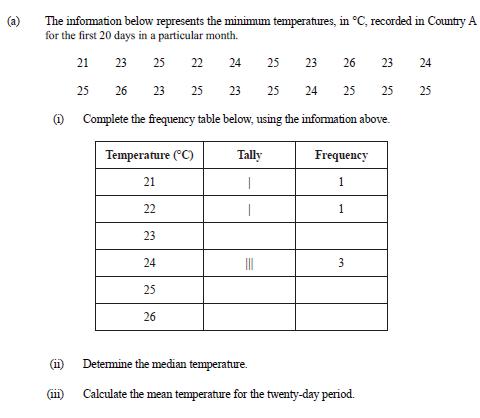
7. Use clothespins to make figures around cradle.
8. Use cloth scraps to make simple clothes to glue onto the figures.
9. Make round circles from clay or play dough to make pedestals for figures to stand on. (Push the clothespins into the clay pedestals.)
10. Use black marker to make eyes on the figures. Baby’s eyes will be closed. Move the pieces around with the story, until you have everyone together. (christianitycove.com)


 By The BroThers Grimm
By The BroThers Grimm

The king was greatly delighted to see all this glittering treasure; but still he had not enough: so he took the miller’s daughter to a yet larger heap, and said, ‘All this must be spun tonight; and if it is, you shall be my queen.’ As soon as she was alone that dwarf came in, and said, ‘What will you give me to spin gold for you this third time?’ ‘I have nothing left,’ said she. ‘Then say you will give me,’ said the little man, ‘the first little child that you may have when you are queen.’ ‘That may never be,’ thought the miller’s daughter: and as she knew no other way to get her task done, she said she would do what he asked. Round went the wheel again to the old song, and the manikin once more spun the heap into gold. The king came in the morning, and, finding all he wanted, was forced to keep his word; so he married the miller’s daughter, and she really became queen.



At the birth of her first little child she was very glad, and forgot the dwarf, and what she had said. But one day he came into her room, where she was sitting playing with her baby, and put her in mind of it. Then she grieved sorely at her misfortune, and said she would give him all the wealth of the kingdom if he would let her off, but in vain; till at last her tears softened him, and he said, ‘I will give you three days’ grace, and if during that time you tell me my name, you shall keep your child.’
Now the queen lay awake all night, thinking of all the odd names that she had ever heard; and she sent messengers all over the land to find out new ones. The next day the little man came, and she began with TIMOTHY, ICHABOD, BENJAMIN, JEREMIAH, and all the names she could remember; but to all and each of them he said, ‘Madam, that is not my name.’
The Finance Ministry on Friday disclosed that the recently announced eight per cent salary increase for all Public Servants and the one-month bonus for the Joint Services have been paid, and more than 52,000 employees in the Public Sector have benefitted.

“More than 52,000 Public Servants, teachers, members of the Disciplined Services, and Government pensioners received their 2022 salary increase in the last week, representing payment of the eight percent retroactive salary increase announced by President Ali on November 17 last, along with the substantive December salaries and pensions,” a statement from the Ministry detailed.
Senior Minister in the Office of the President, with Responsibility for Finance, Dr Ashni Singh, has used the opportunity to laud the Finance Ministry’s staff, who worked tirelessly and diligently to ensure that the increases were paid out in time for the Christmas Season to eligible persons, together with the retroactive amounts on the designated payday.
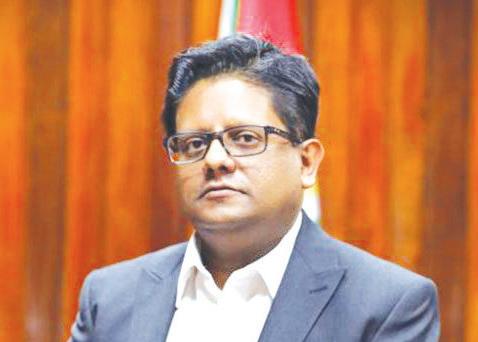
The Ministry also ensured that members of the Disciplined Services received the one-month taxfree bonus today, just in time for Christmas. This bonus was announced by the President on Wednesday,
December 21, and has placed over $1.3 billion in the hands of members of the Disciplined Services.
“All efforts were made by staff of the Ministry of Finance, along with the respective Finance Departments across Ministries and Regions, to ensure that workers received their December salaries along with the retroactive payments, in keeping with Government’s promise,” the missive added.
Dr Singh further highlighted the importance of persons receiving these payments before Christmas, which would stimulate economic activity across the country. The Finance Minister also recognised the diligent efforts of Finance staff in ensuring that the payrolls of various agencies were processed on time.
In addition to the eight percent salary increase re-

ceived, members of the Disciplined Services and Health workers would also receive salary adjustments in January 2023, reflective of announcements made by President Ali on November 24 and December 12 respectively.
With regard to Health sector workers, the salary adjustment to the tune of $1.5 billion would be to the benefit of over 5,000 health care professionals, while an estimated 8,000 members of the Disciplined Services would benefit from their salary adjustments, which would increase their disposable incomes by over $1 billion annually.


President Ali has highlighted that his Government’s focus is on an holistic plan of improving workers’ lives, with salary increases being one aspect of the benefit that would be provided.
In fact, only last week, the Head of State assured that salary adjustments for every category of workers would be addressed.
“Every sector of employees, their time will come… every category of workers will be addressed, and we are starting from critical areas where there were great anomalies, and that is how we’ve started, and we’re progressing well,” the President told reporters.
He was at the time being asked about increases for teachers, after concerns were raised, since no additional benefits were announced for them.
“I value the work of teachers tremendously. Teachers are an important asset to our country. My own parents were teachers, so no one has to tell me the value of teachers,” President Ali
stated.
Asked about a timeframe within which teachers would see salary adjustments, the Guyanese Leader has said, “I don’t want to give you a timeframe, but as you can see, things are happening very quickly in this country.”
Nevertheless, the Head
of State has pointed out that his Government’s intention is to improve the overall welfare of citizens, not just focus on salaries. This, he noted, includes improving healthcare delivery, quality of infrastructure, the quality of water, and reducing the cost of electricity, among other things. (G8)
“With pride, the relations between our nations are anchored in history like one of the huge trees in the Guyanese forests with deep roots which we have the sacred duty to protect so that we may continue growing [and] be fruitful,” the diplomat stated.
The Cuban Ambassador further posited that during these past 50 years of bilateral relations, there have been many achievements that benefited both Guyana
and Cuba – particularly the training of more than one thousand Guyanese professionals in Cuba and the presence of the Cuban medical brigade in Guyana consistently for some 46 years.
“The achievements we have accomplished undoubtedly constitute a solid ground for further progress. In this regard, I wish to express the willingness of the people and the Government of Cuba to continue working hard to
FROM PAGE 3
protect and strengthen the relationship between our two nations,” Ambassador Socorro, who is wrapping up his five-year tenure in Guyana, noted.
Among the attendees at Thursday’s reception were: Prime Minister Brigadier (ret’d) Mark Phillips, Foreign Affairs and International Cooperation Minister Hugh Todd, other Cabinet Ministers and members of the diplomatic community. (G8)
Aman convicted of attempted murder has had his jail sentence reduced by the Court of Appeal.
Hansel Andre Lewis, also called “Smiley”, of Angoy’s Avenue, New Amsterdam, Berbice, was found guilty of attempted murder in 2016 over the New Year’s Day 2013 stabbing of another man.

Lewis, 43, was unanimously found guilty of unlawfully and maliciously wounding Chris Burrowes, called “Bully”, with intent to murder him.
Following his conviction, Lewis, who was initially jailed for 13 years by the trial Judge, mounted an appeal against his conviction and sentence, through Senior Counsel Murseline Bacchus.
Lewis in his appeal had advanced several grounds of appeal relating to errors in
law made by the trial Judge. He had also argued that the jail term was manifestly excessive.

The appellate court earlier this week dismissed
Lewis’s appeal against his conviction but allowed his appeal against his sentence which it reduced to 10 years, minus time already served.
According to the prosecution’s facts, Lewis had slashed Burrowes to the throat while outside a bar on New Year’s Day. Burrowes had told the court that he had known Lewis for several years. He had also said that, on the day in question, he was in the vicinity of the Rainbow Bar in New Amsterdam when Lewis came and stood next to him smoking something that smelled unpleasant.
He said he asked him to move, and moments after, Lewis attacked him with a knife and fled.
The injured Burrowes was transported to the New Amsterdam Hospital, where he was admitted to the Intensive Care Unit (ICU) and was discharged some 18
days later.
Meanwhile, throughout the trial, Lewis had maintained that he was wrongfully accused of the crime. The convict had told the jury that he and Burrowes were at a bar consuming alcohol when an argument ensued between them, after which they both went their separate ways.
He had said that he could not recall any physical altercation between them.
In a probation report, it was disclosed that Lewis “felt bad” about the incident, even though he maintained his innocence.
The report disclosed that he had migrated to the United States in 1990. However, after coming into conflict with the law, he was deported to Guyana in 2002.

A report from the National Psychiatric Hospital revealed that Lewis was admitted to the institution in 2008 for drug abuse. Investigations conducted in his neighbourhood revealed that he is known for his alcoholic tendencies, and has caused disturbances in the community.
A medical doctor had testified that Burrowes suffered a gaping wound measuring seven centimetres in length with a depth of six centimetres. The doctor had explained that the injury resulted in temporary disability and a permanent scar. (G1)
It’s been ten years since Burnham’s successor as President of Guyana - Hugh Desmond Hoyte – passed. His accession was a bit unexpected, since Burnham was only 62 when he died on the Operating Table at Georgetown Public Hospital - supposedly suffering from an undisclosed “throat ailment”. Hoyte had been seen as a loyal apparatchik, initially plucked from Burnham’s law office to oversee matters on the Elections Commissions in 1967 as Burnham prepared the ground for the big rig in 1968. Lots of folks felt he was made PM by Burnham because the latter felt that Hamilton Green – who was convinced he was the heir apparent – was getting too big for his britches!!

Hoyte, with absolutely no political base, was seen as a safe placeholder after the faithful Ptolemy Reid had stepped aside as PM in 1984. As soon as he took over, with the support of Reid, Hoyte was made PNC leader – to the gnashing of teeth by Green!! Hoyte immediately proceeded to rig the 1985 elections to give himself a bigger majority than Burnham ever did!! Clearly, his introduction into the PNC as a cog in the first rigging apparatus served him well!! But, going forward, it was obvious he’d absorbed the art of Machiavellian politics from his “Comrade Leader” more than most had suspected!!
Before you could say “Abna Babna”, Hoyte had earned the sobriquet “Silver Fox” - not just because of his grey hair – but for the way he eliminated the “Burnhamites”, even as he swore fealty to their cooperative socialist line!! Your Eyewitness has no desire to expand on how he abandoned that ideology and signed on with the IMF to get rid of the albatross of debt Burnham had bequeathed him!! Save to say that Guyanese displayed their wit under pressure when they summarised the IMF’s “Economic Recovery Program” (ERP) as an “Empty Rice Pot”!! And when he devalued our currency by a factor of ten, everyone started singing Sparrow’s “Ten to one is Murdah”!!
But his real mettle was shown after accepting Jimmy Carter’s suggestion to abolish “overseas voting” for the 1992 elections. His nemesis, Hamilton Green – then PM –told him to his face that “only an inexperienced schoolboy” would do that!! Hoyte promptly expelled him from the PNC!! Green also severely criticised him when he accepted the loss of the 1992 elections – just as he did Granger in 2020. They ignore that Burnham was allowed to get away with rigging not because of some political legerdemain, but because of the US’ hard Cold War political calculus!!
Anyhow, facing criticism, as Opposition Leader, about his strategy, from some young lions in the PNC, he summarily dismissed the young General Secretary – Aubrey Norton.
The GS was the Leader’s “creature”. He who appoints can dismiss!


Your Eyewitness heard the Opposition Leader criticising the Government for plunging ahead with all these “mega projects” - while Guyana still has so many poor people. Forty-nine percent, he quoted the IMF as saying. But the OL should remember the aphorism, “Give a man a fish and you give him a meal for the day. Teach him to fish and you feed him for life.” The point of the matter is that the Government’s trying to attract businesses of all types to Guyana, so they can offer jobs to our citizens -- while avoiding the Dutch Disease of being dependent only on natural resource extraction.
But businesses need cheap electricity and good transportation facilities - roads and bridges etc. -before they’ll come. We know this not only because that’s how other ex-colonies developed while others like us stagnated, but because the notion of deferred gratification for development is now accepted as applicable to countries as well as to persons!
Intergenerational wealth comes only from accumulated capital. You gotta first invest your income to build it!!
The Afghan Taliban Govt have explained why they’ve banned women from universities. It’s not just the decadent westernizing ideas, but evidently, subjects like “engineering” aren’t suitable for women.
Just keep them barefooted and pregnant down on the farm!!
gas stove for his motherwho is currently a cancer patient at the Georgetown Public Hospital.
In his letter, he wrote
were all smiles as they received Christmas gifts from the Agriculture Minister. Over 500 kids were at this exercise.
On Friday, excitement
marked the faces of scores of children within the community of Riverview, Georgetown, when Minister within the Housing Ministry, Susan Rodrigues spread Christmas cheer across the region.
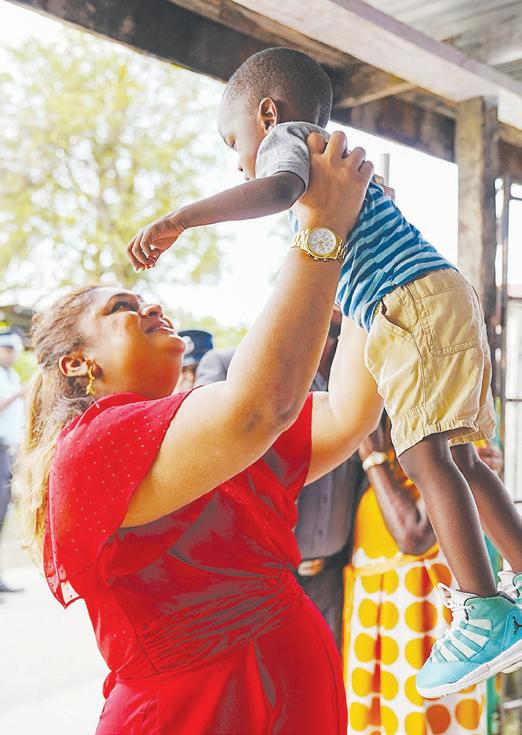

The eager boys and girls gathered at a prominent spot in the area and also had
the opportunity to interact with the Minister. Minister Rodrigues also took the time to engage some of the parents and other residents of Riverview, who were present.
Education Minister Priya Manickchand visited the community of Bare Root on the East Coast of
Demerara, and spread some Christmas cheer with the children and elderly residents of the community. Minister Manickchand told everyone in attendance that her presence represents Government’s plan to continue working with the community to bring development and services to all. (G12)


Several Government Ministers have been busy this past week, delivering toys and granting wishes to thousands of children across Guyana.
Human Services Minister, Dr Vindhya Persaud distributed toys and granted the Christmas wishes of children living with disabilities and other difficult circumstances on Thursday, and treated them

that a new stove is his mother’s heart’s desire since she doesn’t own one.
Upon receiving his letter, the Ministry sought assistance from Qualfon Guyana and the company immediately agreed to assist by purchasing the stove. This was handed over to the young lad by Minister Persaud.
Agriculture Minister Zulfikar Mustapha also dis-
to other sweet goodies.

However, a monumental wish was granted when a young boy’s wish for his mother suffering from cancer became a reality. Sixteenyear-old Christopher Augustus would have written a letter to the Human Services and Social Security Ministry’s Wish Upon a Star Initiative, wishing for a new
tributed toys and other treats to children from Crabwood Creek, Corriverton, Number 63 Village, Adventure, Kildonan, Black Bush Polder, Hampshire and other villages along the Corentyne Coast. Over 10,000 children benefited from that exercise.
One day prior, children from Port Mourant and other surrounding communities
Chief Executive Officer of the Guyana Lands and Surveys Commission (GLSC), Enrique Monize, has warned persons who possess lease lands against selling or re-leasing them, noting that the agency is not in the business of real estate.
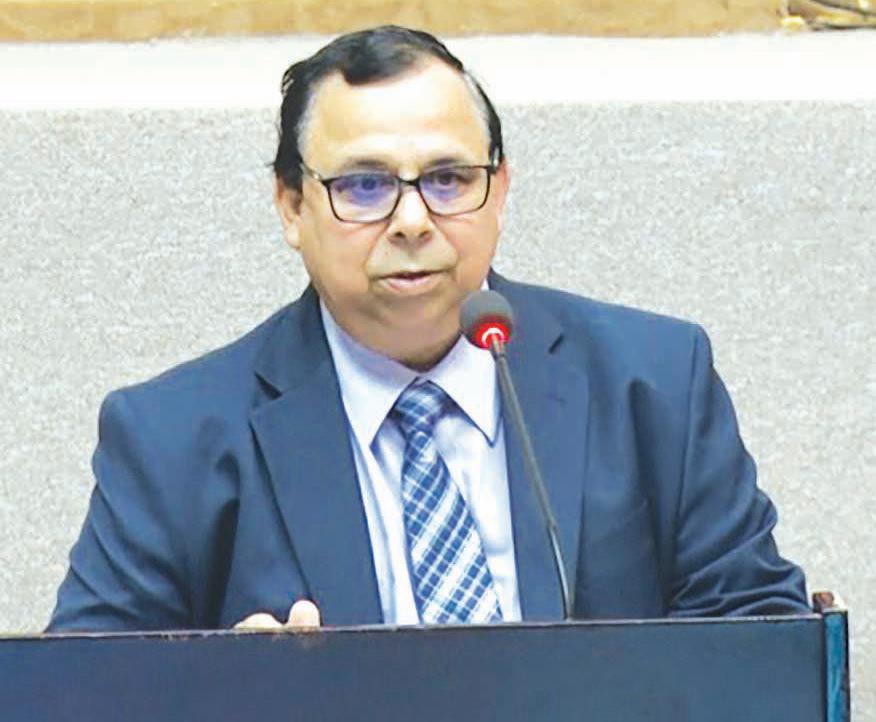
He was at the time speaking at a recent exercise which saw dozens of leases handed over to persons at the Arthur Chung Conference Centre (ACCC).
The GLSC Head has revealed that the entity is aware, and looking into cases of persons listing state lands for sale.
“If you run the ads in the land market, [where] there is a lot of state lands available for sale -- quite a lot, and we’ve been checking on them – we will be checking on them,” he said. “We will not allow persons to attempt to sell [state] land. We’re not in the business of real estate. We’re giving people
the opportunity to have a piece of land; to own a piece of land for their own development…to empower you; not to sell it for a profit, because we could have sold it too. We could’ve just called a sale and have everybody come in and pay $2 million and get the piece of land,” Monize pointed out.
Currently, state lands are being leased at a meagre rental cost of $100 per acre. This fee was reintroduced by the People’s Progressive Party/Civic Government, in keeping with its Manifesto promise, after the previous A Partnership for National Unity/Alliance For Change (APNU/AFC) Coalition regime had increased the fee. In some instances, the rents were doubled, and even tripled.
Monize further emphasised that the sale of state lands is not allowed, and he encouraged leaseholders to ensure they develop their properties in accordance
with the terms of their leases.

“We expect you to take up the lands and do what you proposed to do in your application to us. If you say you’re going to build a house, go build a house. If you say you’re going to do agriculture, go do agriculture; because some of these lands are also in areas that are zoned for certain things. You cannot take an agriculture land and say you’re going to put up a sawmill, or a residential land and you put up a sawmill to the detriment of the neighbours. So, ensure that you utilise the land in the manner you proposed,” he stressed.
The leases that were issued to persons on Wednesday provide a 50year security of tenure. This allows the lease holders to mortgage the lands for developmental purposes.
Additionally, these leased lands can also be passed down through wills.
“If you have developed the land, and let’s say you build a house, you can leave that property in a will for whomever the beneficiaries are, and it is transferrable,” the GLSC Head stated.
But Monize went on to explain that while these leased lands can be transferred, permission is needed from the Lands and Surveys Commission to do this. “When that request comes to us for a transfer, we do an inspection. If we see bush, we’re not going to transfer it, because it just means that you [could] just collect the lease and sell it. But if you have development, that’s a different story. You’re allowed to transfer your development, because your development will have value. So we do transfers based on merit, it is not something automatic,” he stressed.
Meanwhile, GLSC CEO disclosed that the agency has had to deal with a back-


log of applications for state lands that existed prior to 2015.
According to Monize, the demand for land across the country has risen incredibly in recent years.
“In 2021, we had over 5,000 requests for land; and currently, we have over 5,000 requests for lands in Region Four alone, that is pending. This is just re-
quests; they have not applied as yet. We’re in the process of allocating and we’re working from a list of around 5,000. This is more than double the historic records the Commission has seen,” he noted.
The GLSC Head further pointed out that providing lands that are accessible is becoming increasingly difficult. However, he explained that the challenge is not necessarily availability of land, but rather accessibility.
“There are a lot of lands in Guyana, but [there is] the issue of accessibility… Most persons who come to the Lands and Surveys Commission, they will ask you they want a piece of land close to the road and next to a creek. That has been the basic thing… We have many creeks, but we have a few roads; so, in order to meet that criterion, it has to be a very selective process,” he noted. (G8)
In just a few days after President Irfaan Ali visited Region One (Barima-Waini) with plans of enabling greater agricultural pursuits within the communities, mechanisms are already in motion to bring success to the region.
Agriculture Minister Zulfikar Mustapha met with farmers and residents from Sebai, Matarkai sub-district, Region One, on Friday, in keeping with these promises.
During the meeting, Minister Mustapha told farmers that many developmental initiatives are in the pipeline for the region, more so for the cultivation of spices.
He told farmers that the Ministry will supply all the

planting materials for largescale ginger cultivation in addition to finding lucrative markets for their crops.
Farmers also benefitted from shade house materials, Black Giant chickens, farming tools, and other forms of planting materials such as seeds.
Minister Mustapha also committed to assisting the community with a tiller to assist them with land preparation to scale-up their production.
During the President’s visit, he had pointed out that enabling direct market links for agricultural produce to the Caribbean is a major vision planned out for Region One, as he announced a series of investments in electricity and in-

frastructure for it to come to fruition.
In terms of agriculture, Ali told residents that they can expect support to ensure all arable lands are put to use as well as transportation mechanisms to access markets. In the first quarter of 2023, the new MV Ma Lisha will start plying the
Additionally, it was stated that a proper facility in keeping with all health and shipping standards in the region is necessary, to which a new wharf is in the pipeline for storage and shipping purposes.
President Ali had voiced, “We want to help you with the equipment, help you establish the farms so that we can have proper drainage, help you so that we can build the productive capacity in the region and then support you with transportation infrastructure so you can get the produce to the
market…Now that we’re removing the trade barriers in Caricom, we could easily get our food production and agricultural products in the market. What we want do is export directly from here to those locations.”
In the next three years, Guyana, with the assistance of more diversified crops, is aiming to reduce the Caribbean Community’s (Caricom’s) food import bill by 25 per cent.

Guyana currently holds lead responsibility for agriculture, agricultural diversification and food security in Caricom and is spearheading the regional body’s quest to reduce its US$5 billion food import bill.
High on the agenda to address has been taxes and duties, incentivising agriculture, climate-smart resilient agriculture, productivity, technical support, consumption patterns, data collection, regional transport infrastructure, agro-processing and creating a regional brand. (G12)
In early December, Government through the Public Works Ministry had awarded nine contracts for the construction of roads and footpaths, and to desilt drains in the community of Victory Valley, Region 10 (Upper Demerara-Berbice).
This was in keeping with a commitment made by President Dr Irfaan Ali, during a visit to the community, where immediate intervention was called for.
On Thursday, the Ministry informed that some of these projects have reached a significant 90 per cent completion. In awarding those contracts, Government sought to create employment for residents, especially the young people of Victory Valley.
The projects would have included the construction of six concrete footpaths and three concrete drains, totalling $50 million. Another $34 million was invested to construct and rehabilitate the Block 22 Wismar bridge. This project went to public tender and was awarded to the most competitive bid-
der.
Public Works Minister Juan Edghill had told residents, “These contracts are being executed under the Procurement Act in a category that is called community engagement. This is not just something we’re doing here in the Valley. We’re doing this in various parts of the country.”
“It is not just about getting the work done. It is about getting people meaningfully employed and meaningfully engaged. The truth about it is all the workers who will be working on these contracts should really be people from this area.”
The Public Works Ministry was allotted the largest portion of the Government’s $552.9 billion budget this year. Over $96 billion was set aside for development of infrastructure across the country.
From the sum, a total of $88 billion was allocated for capital expenses, encompassing several major projects. Another $76 billion was to be used for roads and bridges. (G12)
North West route, enabling better transportation for produce.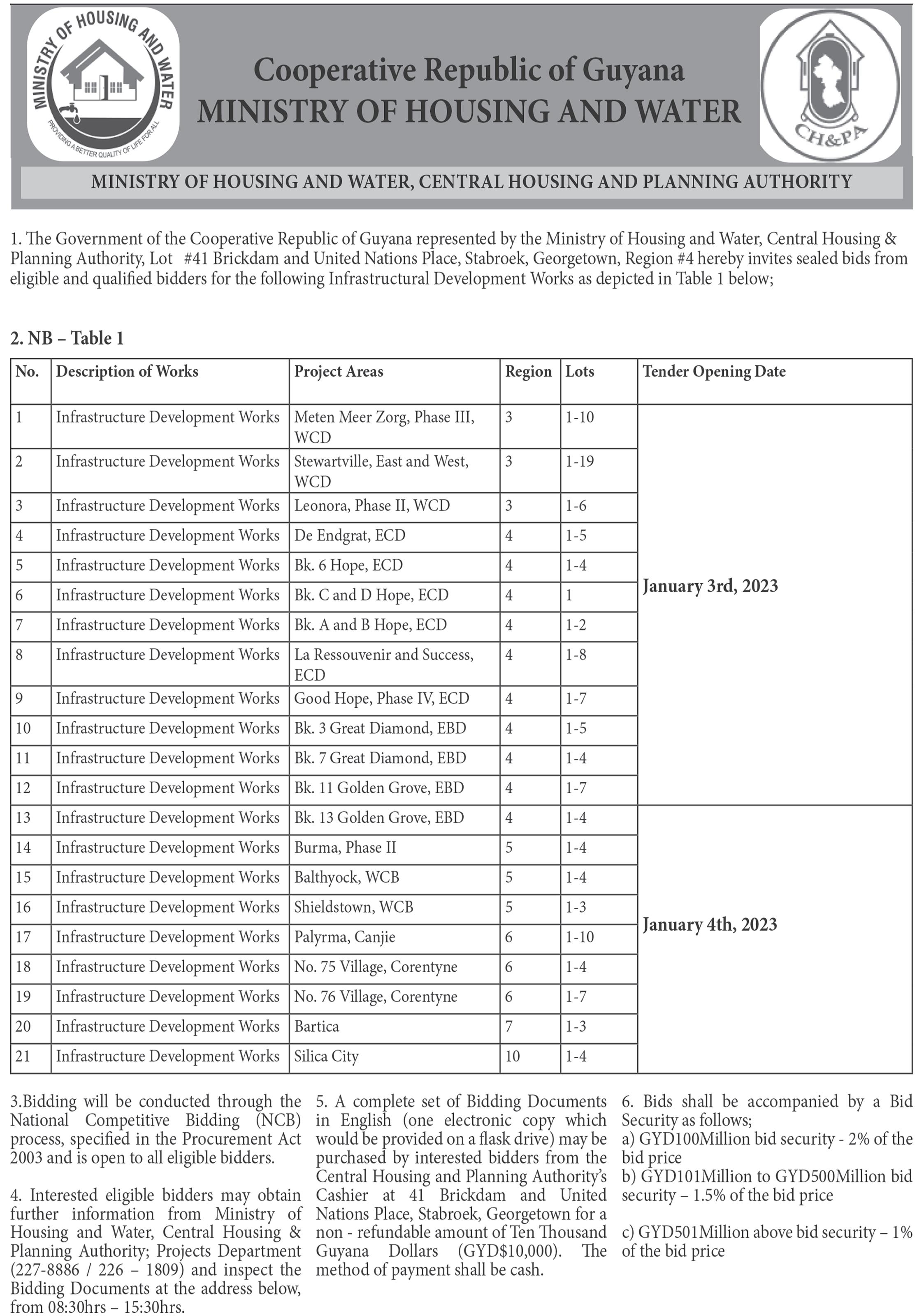
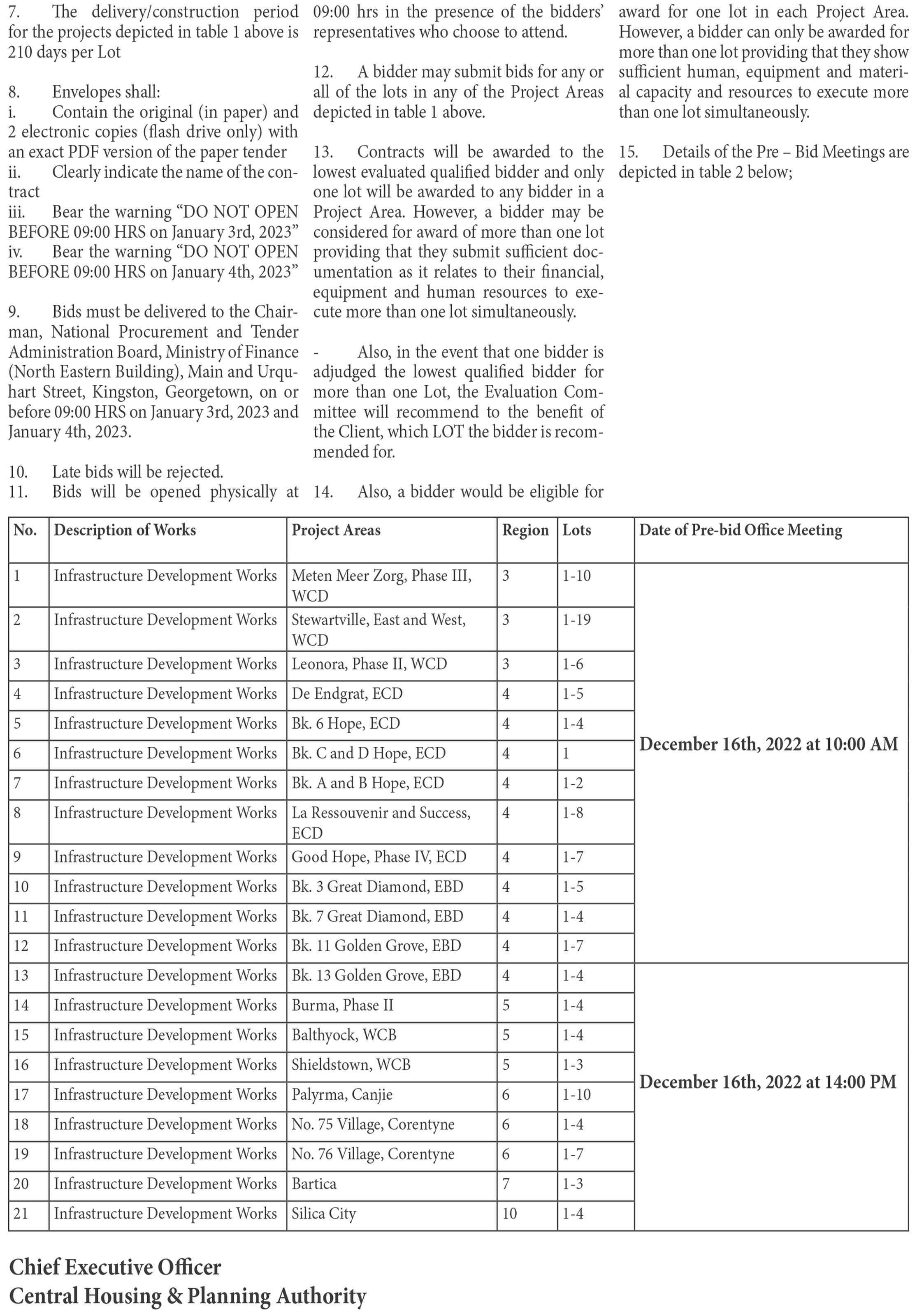
The Guyana Police Force (GPF) is warning members of the public to be alert for possible telephone credit scams.

On Thursday, the GPF said that fraudsters operate under the pretext that they are employed as agents of a particular telephone company and they are contacting unsuspect-
ing members of the public via text, soliciting personal information.
Thereafter, the fraudsters will then send a code via text to unsuspecting persons, and once accepted, the credit will be deducted from their phones.
In light of this, members of the public are therefore urged to not respond to

such messages and to avoid clicking on links in unknown messages.
The GPF further stated that they are currently working with the telephone companies to address this issue.
Over the past few years, Guyanese across the country have been defrauded of huge sums of cash and the
wave of cell phone scams is continuing. Two years ago, it was said by one of Guyana’s telephone companies that little can actually be done by the company to tackle the scam artists since the issue does not originate from them.
Despite advisories and messages often being sent out to customers advising them to be wary of scams,
several persons continue to be victims.
Earlier this year, the Guyana Telephone and Telegraph Company (GTT) had urged all subscribers to be vigilant of scammers, in light of the company’s recent Christmas promotion and upcoming anniversary promotions.

Chief Operations Officer (COO) of Mobile Service,


Richard Stanton said while the company has not received a huge amount of scam reports this year compared to previous years, the company is still keen on advising customers to be vigilant.
“Based on reports over the years, customers are oftentimes urged to top up an account, send MMG or even pay money to uplift prizes. We would never ask a customer for money to uplift any prize,” the COO stressed.
He added: “All of our promotions are reflected on our social media pages and even on our website via https://www.gtt.co.gy/ promotions; so, we urge our subscribers to be aware of these scammers to avoid being conned.”
The COO also reminded that customers can query promotions through the company’s customer care line on 0488, its live chat via gtt.co.gy, and through its customer service representatives at any GTT store. (G9)

Aman from Regional Division Two (PomeroonSupenaam) was arrested after he was caught with a quantity of marijuana.
Reports are that the 23-year-old sawman of Mashabo Mission was intercepted as he was riding a bicycle along Mashabo Mission, Essequibo Coast at 11:45h on Thursday.
Police said they were on mobile patrol at Mashabo Lake Top, Essequibo Coast, when they spotted the sawman and requested to conduct a search on his person and belongings. Police said during the search on his person nothing was found, but a further search was conducted on his backpack, and a white tissue containing several leaves, seeds, and stems of suspected cannabis was found.

He was told of the offence committed and arrested. The narcotics were weighed in his presence and amounted to 6.36 grams. Nelson was placed in custody pending charges.
This is the second ganja discovery within a matter of days along Essequibo Coast. On Monday last, law enforcement officers in Essequibo said their ranks
were on mobile patrol along the Essequibo Coast when a young man was observed attempting to dispose of a transparent plastic bag from a shop.
The bag instead hit the wall and fell back into the shop. As the ranks moved closer, the man retrieved the bag and kept it in his possession.
Ranks approached the suspect and conducted a search on his person, un-
earthing the plastic bag which contained ganja. The young man was told of the offence committed and cautioned.
A further search conducted in the shop resulted in the discovery of a black plastic bag with another quantity of cannabis. The young man was arrested and later charged.
The cannabis was weighed and amounted to 76.9 grams. (G9)

AHuis’t Dieren, Essequibo Coast man, who was caught by the Police with less than an ounce of marijuana, has been fined $30,000 by Magistrate Esther Sam.
Latchman Singh called “Tallman”, 25, a labourer, pleaded guilty to the charge which alleged that on December 19, at Huis’t Dieren, he had 20.26 grams of marijuana in his
possession for the purpose of trafficking. He was brought before the Anna Regina Magistrate’s Court.
Failure to pay the fine will see him spending two months in prison.
Meanwhile, in a separate case, 34-year-old Tuffic Bridglall of Lot 8 Windsor Castle, Essequibo Coast, was charged with trafficking 4.5 grams of cocaine on December 21.

Bridglall, a ranger, was
allegedly found with the substance on Danielstown Backdam Road, Essequibo Coast. He appeared at the Suddie Magistrate’s Court on Thursday.
After he denied the charge, Magistrate Esther Sam released him on $10,000 bail.
His case will be heard again on January 31, at the Anna Regina Magistrate’s Court. (G1)


of Parliament (MPs) chal-
The ruling, which was initially set for December 8, has been postponed until January 16 at 15:00h.
Opposition Chief Whip Christopher Jones, Ganesh Mahipaul, Sherod Duncan, Natasha Singh-Lewis, Annette Ferguson, Vinceroy Jordan, Tabitha SaraboHalley, and Maureen Philadelphia were, in July, officially suspended for breaching the National Assembly’s Standing Orders by participating in the infamous grabbing of the Speaker’s Mace — the most significant symbol in the National Assembly –and for disrupting the sitting of the National Assembly on December 29, 2021, during their protest against readings of the Natural Resource Fund (NRF) Bill.
Following investigations, the Parliamentary Committee of Privileges delivered its report in mid-July, recommending the suspension of the eight MPs for violating Standing Orders and established customs and practices regarding acceptable behaviour of parliamentarians.
The Committee of Privileges was tasked with considering a Privilege Motion which stated that the eight Opposition Members, in attempting to prevent the second and third readings of the Natural Resource Fund (NRF) Bill, had conducted themselves in a gross, disorderly, contumacious, and disrespectful manner, and had repeatedly ignored the authority of the National Assembly and that of the Speaker, thereby committing contempt and breaches of privileges.
According to the Committee’s report, its recommendations were based on video recordings, statements by staff of the Parliament Office and the Arthur Chung Conference Centre (ACCC), eyewitness accounts by other Members of the National Assembly, media reporters, and the public, both local and international.

Additionally, each of these Opposition Members had been written to and asked
to “show cause” why sanctions should not be meted out to them. Their responses were received and considered by the Committee. Armed with those responses, the Committee “found that the named MPs were in violation of the Standing Orders and established Customs and Practices regarding acceptable behaviour of Members in the Assembly.” It was thus determined that the appropriate sanction available for the National Assembly to impose is suspension from service in the House.
Against Attorney General Anil Nandlall, SC, House Speaker Manzoor Nadir, and Clerk of the National Assembly, Sherlock Isaacs, the Opposition MPs are seeking, among other things, a declaration that the report of the Committee of Privileges is unconstitutional, null, void, and of no legal effect; and that their suspension is a breach of the principles of natural justice, because their rights, as guaranteed under Article 144 (8) of the Constitution, have been infringed.
Their request for an interim order suspending any decision, resolution, or other determination made by the National Assembly to suspend them and for another interim order allowing them to perform their duties until they have been afforded the right to be heard before the Parliamentary Committee of Privileges, pending the hearing and determination of their case, have been refused by both Justice Younge and by the Demerara Full Court.
Notwithstanding the findings of the Committee of Privileges, the APNU/AFC parliamentarians, in legal documents seen by this publication, contend that they are “unaware of any act of ours on the day in question falling in the category of gross disorderly conduct, contempt, and breaches of privileges, and that to the best of our recollection, on the day in question, our posture was no different from all other
Members of Parliament who were present…”
According to them, they had specifically requested that the Committee of Privileges identify to them the Standing Orders or privileges they had supposedly violated, as this was essential if they were to effectively exercise the opportunity to show cause.
They complained that at no time were they invited to appear before the Committee of Privileges to be allowed a hearing, nor were they told what action of theirs had violated established customs and practices regarding acceptable behaviour of MPs.
The parliamentarians have argued that the report of the Committee of Privileges would be a published record that would forever inevitably affect their character and reputation.
They argued that any suspension would further hinder them from representing the people who elected them to sit in the National Assembly, and would also prevent Mahipaul from functioning as a member of the Public Accounts Committee (PAC).


They contend, inter alia, that “any suspension will deprive (them) of their full salaries and of the opportunity to be representatives of the National Assembly and people of Guyana at national, regional, and international forums.”
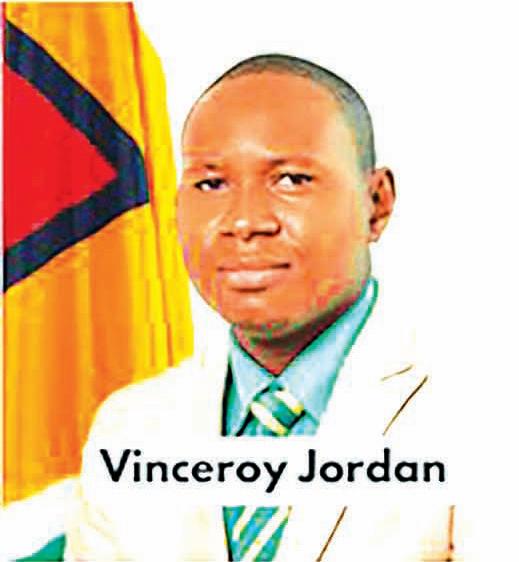
Further, they submitted that their likely suspension is part and parcel of an unconstitutional scheme and/ or device by the Government to utilise its majority in the National Assembly to silence and to reduce the numbers of sitting parliamentary Opposition Members of Parliament.
The Clerk of the National Assembly has already written the suspended MPs, informing them that, during the period of their suspension, they would not be paid salaries and allowances, and would not be entitled to some of the other benefits enjoyed by other Members of the House.
In a clearing of Colombia's Pacific jungle, the dense canopy encircles an area of desolation left by a clandestine refinery, where oil waste blackens everything underfoot, seeping into the soil and coating the vegetation.
The scent of moist earth and flowers is overpowered by the stench of chemicals from stagnant pools - the waste product from a rudimentary refining process that turns oil stolen from a nearby pipeline into a bootleg fuel known as pategrillo, or 'cricket's foot', because of its greenish hue.
The makeshift gasoline is used to make cocaine and helps fuel Colombia's drug trade. The leaves of coca plants are soaked in pategrillo - or other fuels, like gasoline - to extract alkaloid compounds to make
the narcotic, according to National Police. It is also used to power heavy machinery at illegal mining operations, the Police said.
With Colombia's potential cocaine production hitting record levels, according UN estimates, oil theft is on the rise: the volume stolen from two of Colombia's major oil pipelines has more than trebled since 2018 to an average of 3447 barrels a day as of Nov 30, according to Police data.
But little is known about the scale of the environmental impact of spills from tapping pipelines and from illicit refineries, which are often in remote and dangerous regions.
The jungle clearing sheltering the clandestine refinery - larger than a soccer pitch - remained blackened by oil though it was raided
by Police in March and the operation dismantled.
Twisted metal from destroyed barrels and more than a dozen metal cooking stills - capable of processing 500 to 1000 gallons of oillittered the site, just over an hour's walk from the small town of La Guayacana.
Nearby trees had been stripped of their leaves by polluting vapors that escape during the refining operations.
"The damage is extreme. The animals, the trees - everything is totally burned," said Colonel Johan Pena, commander of the police unit charged with tackling oil theft in Narino, a province bordering Ecuador that is known for cocaine production.
"Words aren't enough to show the world the damage." (Excerpt from Reuters)
The World Bank´s Board of Directors approved late on Thursday a US$500 million project in Brazil to expand sustainability-linked finance and strengthen the private sector’s capacity to access carbon credit markets and help the country curb deforestation.
The initiative, in collaboration with Brazilian Statecontrolled lender Banco do Brasil, adopts an approach to lending linked to sustainability to help Brazil meet its climate goals and deliver "robust" mitigation benefits, a bank statement said.
Sustainability-linked financing (SLF) allows for lower financing costs when certain environmental, social and governance (ESG)
requirements are met by a company but does not require the funds to be used for climate-friendly purposes.
At the start of December, the World Bank and its partners launched a global tracking system to clean up the opaque market for carbon credits and help developing countries raise much-needed climate finance quickly and more cheaply.
Carbon credits - generated through activities such as planting forests or pulling climate-damaging carbon dioxide from the airare sold to polluters to offset their emissions as a way of helping them reach net-zero emissions to limit global warming.
"Up to 90 million tCO2e in emission reductions are expected by 2030, the equivalent to about 4.5 per cent of what Brazil needs to stay on track with its net-zero commitments," the World Bank said.
The project is also expected to mobilize up to US$1.4 billion in private capital through the scaleup of financing by Banco do Brasil and private investors.
"Brazil has significant potential to become a global leader in the transition to a low-carbon economy", said Johannes Zutt, World Bank country director for Brazil. "To do so, urgent action is required to complement public interventions with private solutions and financing." (Excerpt from Reuters)
Authorities in the South American nation of Chile are battling two fires that have claimed at least one life and are still threatening property.
A fire broke out at the Ventanas port on Thursday, and a separate forest fire to the south near the coastal resort town of Vina del Mar has killed at least one person and destroyed more than 100 homes.
The Government declared a state of emergency in the Vina del Mar area on Thursday evening after the fire spread quickly. The fire had erupted earlier that day, and within 24 hours, it had burned about 125 hectares (310 acres).
Several neighbourhoods have been evacuated, with
varying levels of home damage reported.
Firefighters have struggled to contain the blazes, but Manuel Monsalve, assistant to Chile’s Interior Minister, said on Friday that “the forecast is to be able to control the fire during the day”.
Officials had previously said that the fire near Vina del Mar, a popular tourist destination about 120 kilometres (75 miles) from the capital of Santiago, had killed two people and damaged or destroyed 400 homes.
By early Friday, Monsalve had revised the number downward, saying that one person had been killed, 30 slightly injured and 130 houses destroyed, according to the AFP.
Reuters has put the number of houses destroyed at 200.
Monsalve said that the earlier overcount was the result of combined estimates from various agencies.
No injuries have been reported in the fire at Ventanas, which is near a refinery and smelter facility operated by the Staterun mining entity, Codelco. The company has said that the smelter was already shut down for maintenance and the refinery is operating as usual.
AES Chile, which operates a coal-fired power plant near the port, has said that the second unit of the plant, which is closest to the fire, has been taken offline. (Excerpt from Al Jazeera)
2020. The city is the wealthiest and most populous area of the country.

Fernandez, in a statement late on Thursday, said the ruling was unjustified and pledged to ignore it.
"It is an unprecedented, incongruous, and impossible-to-enforce ruling," he said, calling the decision politically motivated ahead of general elections next year and adding that it would hurt the other provinces.
Argentina's leftist President Alberto Fernandez has sparked a battle with the country's top court and something of a legal crisis after he said he would reject a ruling it made to give a larger proportion of State funds to the city of Buenos Aires.
The South American country has a system to regulate how State funds are
distribute between the country's regions, including the capital city area, which is controlled by a conservative mayor and had been pushing for a larger slice.
In a ruling on Wednesday the Supreme Court said the level should be raised from 1.4 per cent of the total pool of funds to 2.95 per cent after it was cut by Government decree during the COVID-19 pandemic in
Fernandez, who has seen his popularity slide and whose ruling coalition was badly defeated in midterm congressional elections last year, said that the state would "challenge the members of the Supreme Court" and seek to have the ruling revoked.
His remarks sparked off a backlash on both sides, some agreeing with the President that the ruling was unjustified and others saying the rejection of a Supreme Court decision set a dangerous precedent and undermined the justice system. (Excerpt from Reuters)
Mexican President Andres Manuel Lopez Obrador on Friday said authorities should resolve a case of alleged plagiarism by a Supreme Court justice he nominated who is in the running to take the helm of the country's top tribunal.
Justice Yasmin Esquivel was this week accused by Mexican news outlet Latinus of plagiarising her 1987 university undergraduate thesis, prompting calls for her to step down.
Esquivel called the media report "totally false," and on Twitter posted letters of support from aca -
demics who supervised her thesis and further studies.
When asked about the case during a regular news conference, Lopez Obrador said it was up to authorities to resolve the matter, and noted he could not be wholly objective on it.
He sidestepped questions about whether Esquivel should be removed from her post, saying: "It will be whatever the judiciary or the proper authority decides."
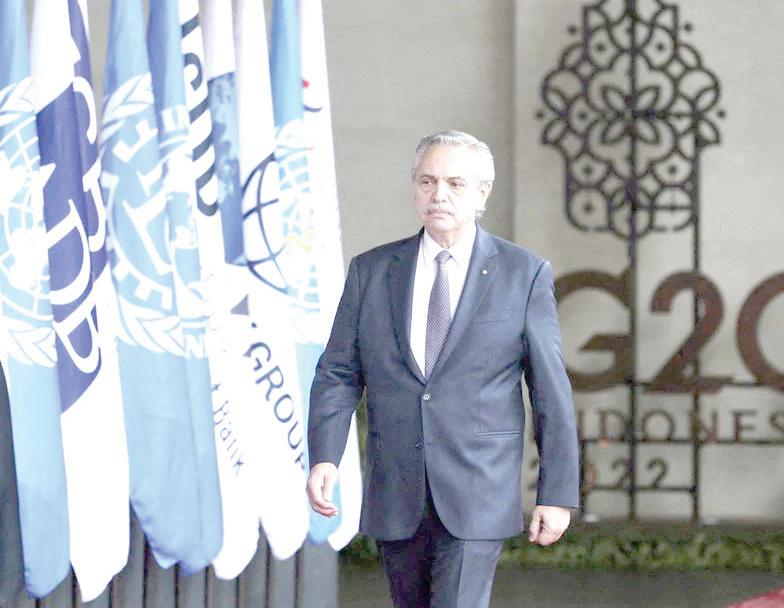
He then lashed out at those criticising Esquivel, arguing that any "mistake" or "anomaly" made by her as a student was "infinitely smaller" than the damage they had done.
"All of those who are asking for the justice to be punished have committed worse crimes," he said.
The wife of a business ally of Lopez Obrador, Esquivel joined the court in 2019, and is vying to take over from Chief Justice Arturo Zaldivar when his term concludes on Dec. 31.
The 11 justices of the court are due to elect Zaldivar's successor in January.
Mexico's National Autonomous University (UNAM), where Esquivel presented her thesis, said on Thursday it would analyse the case and act according to university rules.
(Excerpt from Reuters)Prime Minister Dr Terrance Drew said the authorities have uncovered “a ring” resulting in illegal marriages taking place here and raising the possibility that the twin island Federation is being used for human trafficking.
Prime Minister Drew, who is also Minister of National Security and immigration, told Parliament the illegal marriages involved individuals from the Spanish community that allows them to be granted citizenship and voting rights.
Prime Minister Drew said that while it is possible that some of the marriages are genuine, some of the individuals involved in the marriage ring have been
abusing the system, by marrying and divorcing several times to gain money.
Drew said that he had a meeting with the Latino community and explained to them what the government had identified. He also said that conversations with some of the Spanish nationals proved that there is no real relationship between them and their marriage partner.
“I went to a meeting with the [Spanish] Community and they have legitimate concerns which we have to address because, as was said, we cannot treat people less than human; but at the same time, every country must have rules, laws and regulations as I said to
them.
“Not even in their own country can it be done like that. “You’re asking a married person, “what is your husband’s name? [and they respond] “Well I think – I can’t remember the first name” and [they’re] married. [They were] saying to the AG (Attorney General) or saying to the officials, “well, I don’t know his name; I call him babes.
“It’s a whole ring where we were even being questioned to be part of human trafficking. Madam Speaker, people have to be responsible for these things. Our country was going down the drain,” Drew told Parliament. (Excerpt from Nation News)
Oil prices settled about US$3 per barrel higher on Friday for a second straight week of gains after Moscow said it could cut crude output in response to the G7 price cap on Russian exports.
Brent crude settled at US$83.92, up by US$2.94 or 3.6 per cent, while US West Texas Intermediate (WTI) crude settled at US$79.56 a barrel, up US$2.07, or 2.7 per cent. Both benchmarks recorded their biggest weekly gains since October.

Russia may cut oil output by 5 per cent to 7 per cent in early 2023 as it responds to price caps, the RIA news agency cited Deputy Prime Minister Alexander Novak as saying on Friday.
Russia's Baltic oil exports could fall by 20 per cent in December from the previous month after the European Union and G7 nations imposed sanctions and a price cap on Russian crude from Dec 5, according to traders and Reuters calculations.


"The potential cut from Russia could be giving the bulls more fuel," said Eli Tesfaye, senior market strategist at RJO Futures. "If global demand continues at current pace, that cut could have a significant impact and we may stay in the US$80s range."
Both crude oil demand and output could slump over the next few days due to shut-ins from a massive winter storm that cascaded across a broad swath of the United States. Several of the largest US refineries shut down due to the extreme cold while output shut in Texas and North Dakota.
US gasoline and ultra-low-sulphur diesel futures both rose more than 5 per cent on anticipated refining production cuts and a surge in heating oil demand.
Swiss bank UBS expects prices could move back above US$100 per barrel next year on Russian output cuts and easing of COVID-related restrictions in China, analyst Giovanni Staunovo said.
"The road for higher prices will however stay bumpy," he said. (Reuters)
Facebook owner Meta Platforms Inc has agreed to pay US$725 million to resolve a class-action lawsuit accusing the social media giant of allowing third parties, including Cambridge Analytica, to access users’ personal information.
The proposed settlement, which was disclosed in a court filing late on Thursday, would resolve a long-running lawsuit prompted by revelations in 2018 that Facebook had allowed the British political consulting firm Cambridge Analytica to access data of as many as 87 million users.
Meta did not admit wrongdoing as part of the settlement, which is subject to the approval of a federal judge in San Francisco. The company said in a statement settling was “in the best interest of our community and shareholders.”

“Over the last three years we revamped our approach
to privacy and implemented a comprehensive privacy program,” Meta said.
Cambridge Analytica, now defunct, worked for former leader Donald Trump’s successful presidential campaign in 2016 and gained access to the personal information from millions of Facebook accounts for the purposes of voter profiling and marketing.
Cambridge Analytica obtained that information without users’ consent from a researcher who had been allowed by Facebook to deploy an app on its social media network that harvested data from millions of its users.
The ensuing Cambridge Analytica scandal fuelled government investigations into its privacy practices, lawsuits and a high-profile US congressional hearing where Meta Chief Executive Mark Zuckerberg was grilled by legislators. (Excerpt from Al Jazeera)
Agunman killed three people at a Kurdish cultural centre and nearby Kurdish cafe in central Paris on Friday, prompting violent protests in nearby streets as night fell.
President Emmanuel Macron said France's Kurdish community had been the target of a heinous attack. French Interior Minister Gerald Darmanin said the suspected assailant had clearly wanted to target foreigners.
Multiple gunshots were fired on Rue d'Enghien at about midday, creating panic on a street lined with small shops and cafes in the French capital's busy 10th district.
All three of those who died were Kurdish, a lawyer for the Kurdish cultur-
al centre told Reuters. Three others were wounded, one of them with life threatening injuries.
Riot police fired teargas as darkness descend-
ed to drive back an angry crowd gathered a short distance from the scene of the shootings as projectiles were thrown at officers, rubbish bins and restaurant tables
overturned and cars damaged.
Authorities said they had arrested a 69-year-old man, who Paris prosecutor Laure Beccuau said had recently been freed from detention while awaiting trial for a sabre attack on a migrant camp in Paris a year ago. He was convicted in June of committing violent acts with a weapon in 2016, and had lodged an appeal.
Reuters was not immediately able to contact legal representatives for the suspect.
Images broadcast on French news networks on Friday showed a white man, a French national, wearing a grey top and scruffy white trainers being led away from the scene, his hands cuffed behind his back. (Excerpt from Reuters)
ASt Petersburg politician has asked prosecutors to investigate Russian President Vladimir Putin for using the word "war" to describe the conflict in Ukraine, accusing the Kremlin chief of breaking his own law.
Putin has for months described his invasion as a "special military operation". He signed laws in March that prescribe steep fines and jail terms for discrediting or spreading "deliberately false information" about the armed forces, putting
people at risk of prosecution if they call the war by its name.
But he departed from his usual language on Thursday when he told reporters: "Our goal is not to spin the flywheel of military conflict, but, on the contrary, to end this war."
Nikita Yuferev, an opposition councillor in the city where Putin was born, said he knew his legal challenge would go nowhere, but he had filed it to expose the "mendacity" of the system.
"It's important for me to do this to draw attention to the contradiction and the injustice of these laws that he (Putin) adopts and signs but
which he himself doesn't observe," he told Reuters.
"I think the more we talk about this, the more people will doubt his honesty, his infallibility, and the less support he will have."
In his challenge, filed in an open letter, Yuferev asked the Prosecutor General and Interior Minister to "hold (Putin) responsible under the law for spreading fake news about the actions of the Russian army".
Yuferev, who asked Reuters not to disclose his location, said Putin critics who publicly called the war a war have suffered harsh punishments. (Excerpt from Reuters)
Passengers at United Kingdom airports experienced long delays after Border Force officers walked out as part of the latest strikes of public sector workers across the country.
More than 1000 passport control staff are expected to walk out on the first day of a strike that is planned to last until New Year over pay, according to the Public and Commercial Services Union (PCS).
The walkout is the latest addition to strikes of nurses, paramedics, and workers in the rail and postal sectors in the biggest wave of industrial action over pay and conditions in Britain for decades.

Following stoppages, the Government refused to increase pay following years of wage stagnation and a costof-living crisis that has seen inflation running at nearly 11 per cent.
The strike, organised by the PCS, is the first of eight planned between Friday and
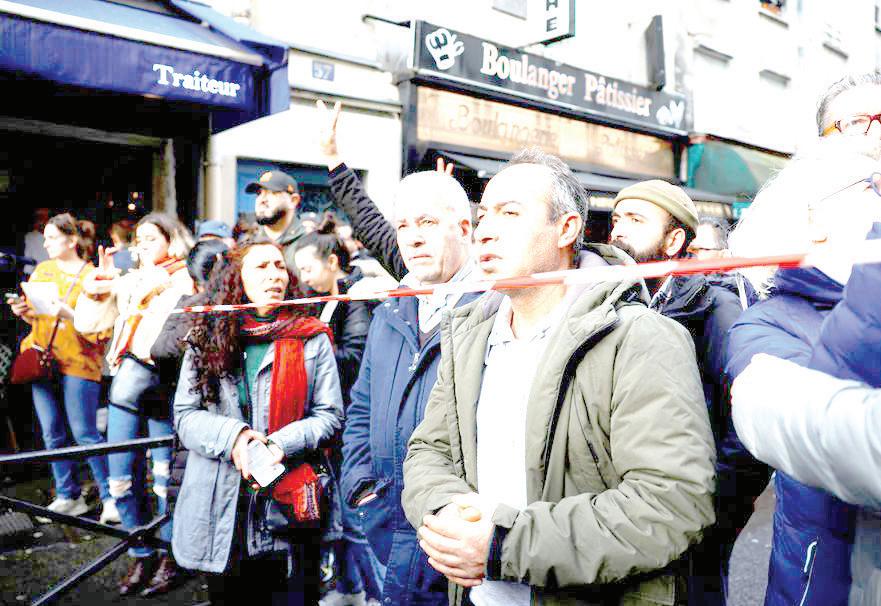
January 1 at six UK airports.
The Government has drafted in armed forces personnel and civil servants to operate passport booths at the airports – Heathrow, Birmingham, Cardiff, Gatwick, Glasgow and Manchester and the southern coast port of Newhaven.
PCS General Secretary Mark Serwotka said many Border Force employees were struggling with the cost-ofliving crisis.
“Forty-thousand of our members are using food banks; 45,000 of them are claiming in-work benefits. They are the in-work poor,” he told BBC radio, adding that the dispute was also about pensions and job security.
Travellers were warned to expect delays as they might face long queues at passport control that could lead to people being held on planes, disrupting subsequent departures. (Excerpt from Al Jazeera)
Indian Prime Minister Narendra Modi has urged people to start wearing masks again as the country steps up surveillance of Covid cases.
Modi held a review meeting on Thursday amid a surge in cases in China which has put India on alert.
The Prime Minister called for increased testing and encouraged a return to COVIDappropriate behaviour.
India had relaxed its COVID rules, including mask-wearing, earlier this year after a drop in infection levels.
The country witnessed two deadly waves in 2020 and 2022 - and the Government had come under heavy criticism for its handling of the second wave in the summer of 2021 when thousands died amid a lack of oxygen supplies and critical medicines.
At Thursday's meeting, Modi asked states to ensure operational readiness of hos-
pital infrastructure, including a healthy supply of oxygen cylinders and ventilators.
While there was no reason to panic, the Prime Minister cautioned against complacency and urged citizens to take all necessary precautions.
According to Government data, India currently has only around 3400 active coronavirus cases, but reports of the surge in China have created a sense of fear among many people.
Over the past few months, India has reported four COVID-19 cases caused by BF.7, the Omicron subvariant linked to a spike in cases in China.
The cases - three in Gujarat state and one in Odisha - were detected in July, September and November and the patients have recovered, health officials have said.
Several experts have said that India does not have reason to panic. (Excerpt from BBC News)
Passport control staff strike at 6 UK airports for better pay







Stop, look, listen and proceed with caution. Don't get into a no-win situation with someone who doesn't share your opinions. Focus on keeping the peace. Enjoy the festivities.

(March 21-April 19)
(April 20-May 20)


It's a great day to spend with family and friends. Conversations will be lively, and sharing ideas and suggestions will prove entertaining. Don't hesitate to join in and be a part of the festivities.
Pick up the pace so you can enjoy the festivities. Take the pressure off others by doing little things that make them feel special. Create a positive atmosphere that is welcoming and safe.
(May 21-June 20)
(June 21-July 22) (July 23-Aug. 22)

Think twice before you agree to take on a challenge. You can have fun without taking a risk. Focus on friends, family and heartfelt conversations that help you understand what loved ones want and how they feel. Romance is on the rise.
Address situations that baffle you. Ask questions, and you'll discover something that helps you make a good decision. Don't feel you have to overspend to impress others. Choose to be practical.

Make the most out of situations as they arise, and everything will be fine. Embrace activities that include people of all ages, and you'll gain valuable insight. Romance is encouraged.

(Aug. 23-Sept. 22)



(Sept. 23-Oct. 23)

Don't be fooled by what someone does or says. Listen carefully, and don't share sensitive information. Busy yourself with preparations and activities that lift your spirits. Avoid discord.





(Oct. 24-Nov. 22) (Nov. 23-Dec. 21)








Use your ingenuity, and you'll find a way to surprise a loved one. Getting together with friends and family will provide insight into what others are up to and how you might get involved.
Look for the good in everyone, and you'll find a way to overcome differences. Check the information you receive before passing it along. Be a good listener as well as a good conversationalist.
Promote solutions and do your part to celebrate the festive season. Time spent with family and friends will bring you closer. Being a good listener will bring out the best in you.
(Dec. 22-Jan. 19)
(Jan. 20-Feb. 19)


Keep your thoughts to yourself, or you may reveal someone's surprise. Pick up the pace, focus on last-minute preparations and enjoy time spent with family and friends.
Relax with people who put a smile on your face. Focus on love, romance and making memories you'll cherish forever. Don't hesitate to say no to a situation that could be risky.
(Feb. 20-March 20)

Rishabh Pant (93) and Shreyas Iyer (87) have both missed out on centuries, but have put India in a strong position with a significant 87-run first innings’ lead on Day 2 of the second Test in Mirpur.
Bangladesh bowlers, led by Taijul Islam (4-74) and skipper Shakib al Hasan (4-79), led the team's fightback on either side of the damaging 159-run fifth-wicket partnership that came in just 30.1 overs.
Bangladesh began on a bright note, with Taijul's triple strikes keeping a tight lid on India's scoring in the morning session. He became only the second Bangladesh cricketer, after Shakib, to dismiss India's top-three in an innings.
On a track which still had enough assistance for the bowlers, India's sedate start to Day 2 was interrupted in the sixth over when KL Rahul was hit flush on the front pad. The loud, confident appeal was turned down on-field, but Taijul convinced his captain to opt for a review with three seconds remaining on the clock, and was vindicated. He struck again on the first ball of his next over to take out the other overnight batter, Shubman Gill - trapped plumb in front this time, after completely missing his attempted sweep.
While the runs weren't exactly forthcoming, Cheteshwar Pujara and Virat Kohli stuck it out. The third-wicket pair

stitched a handy partnership of 34, but just as they looked settled in, an alert piece of fielding from Mominul Haque at forward short leg got Bangladesh another vital breakthrough. In disbelief, Pujara stood his ground, even as the umpires went upstairs to check Bangladesh's claim of a low catch. The India #3 had gently nudged a fuller delivery towards the close-in fielder, and the replays confirmed the catch to be legit.
India could have been in further trouble had Bangladesh latched on to any of the chances offered early on by Pant or Virat Kohli. While the former had slashed at a short and wide delivery from Mehidy Hasan Miraz that was shelled at slip, the latter nearly ran himself out, taking off for a non-existent single last ball before lunch.
Kohli, however, didn't last
long after. Taskin Ahmed, at the beginning of a testing postlunch spell, got the former India captain to poke at a delivery outside off, and sent him packing for a hard-earned 24.
However, that was only the beginning of a two-hour toil for the hosts, as Pant and Iyer threw caution to the wind. The pair transferred the pressure right back onto Bangladesh with a stunning counterattack that turned the game on its head.
After being watchful for about a dozen deliveries upfront, Iyer took on the shortball challenge from Taskin, and dispatched the pacer for back-to-back boundaries to get going. The extra bounce did take him by surprise early on. Iyer got away with one he awkwardly pushed at; it flew just wide of gully, but he nearly got caught on 19, one ball later, when he slashed hard at another such ball.
Pant meted out similar treatment to Khaled Ahmed, picking back-to-back boundaries as the pair raised their fifty stand in under nine overs. He took on Taijul next, merri-
ly slog-sweeping Bangladesh's best bowler on the day over cow-corner, before reaching his own half-century in just 49 deliveries.
Iyer got a second life on 21 when Nurul Hasan fluffed a stumping opportunity off Shakib, and the batter made Bangladesh pay immediately with two stunning boundaries -- a late-cut and a loft straight down -- to close the over leading up to the drinks break.
On the other side, Pant added insult to Shakib's injury with a one-handed six smoked straight over long-on, to force Bangladesh into a bowling change. That proved to be of little help though, as the India 'keeper welcomed Mehidy back into the attack with another maximum that would have ideally been caught at the ropes by the leaping Mushfiqur Rahim.
Pant used his feet excellently to put the Bangladesh spinners under pressure, and Taijul was at the receiving end once again when the batter brought up the hundred of his partnership with a four, and India's 200 next ball with another brutal hit over long-on ropes.
A trademark one-handed 100m strike followed in the next over from Mehidy.


Iyer, who reached his second successive fifty of the series just before heading for tea, put India in a lead with a brace right after. He then went on to raise both the impending milestones - 150 of the fifth-wicket partnership and India's 250with a four each.
But Shakib played the architect of Bangladesh's little fightback in the evening, that saw India lose their last
six wickets for just 64, once Mehidy had managed to break the stand at 159.
Visibly in some discomfort, Pant fell in the 90s for the sixth time in Test cricket when he gently poked at a delivery spinning away from him, to send an edge to the keeper. Axar Patel walked out ahead of Ashwin to help India maintain the left-right combination, but departed cheaply as he tried to take the aerial route against Shakib.
The Bangladesh skipper picked up the bigger prize in his next over when he trapped Iyer plumb in front as Iyer missed his sweep. Just 13 away from his century, the India batter opted for a desperate review, but to no avail. Bangladesh had sent a couple
of calls upstairs before Ashwin was finally given out LBW to Shakib, who had picked his third in quick succession.
Once Umesh Yadav had pushed India past the 300-run mark with his boundary-filled little cameo of 14, Taijul had him edging to slip for his fourth wicket, while Shakib got his fourth wicket a couple of overs later when Siraj slogged and missed and Nurul was quick to dislodge the bails. With the pitch only getting tougher to bat on as the game progresses, India's lead of 87 could prove quite handy.
Bangladesh openers did manage to bring it down to 80 while safely negotiating a tricky phase of six overs under lights before the stumps were drawn. (cricbuzz)
ov), 8-286 (Ravichandran Ashwin, 80.1 ov), 9-305 (Umesh Yadav, 83.3 ov), 10-314 (Mohammed Siraj, 86.3 ov)
BOWLING O-M-R-W
Taskin Ahmed 15-2-58-1 Shakib Al Hasan 19.3-3-79-4 Khaled Ahmed 10-1-41-0 Taijul Islam 25-3-74-4 Mehidy Hasan Miraz 17-2-61-1
Bangladesh 2nd Innings
Najmul Hossain Shanto not out 5 Zakir Hasan not out 2
Extras 0 TOTAL 6 Ov (RR: 1.16) 7
BOWLING O-M-R-W Umesh Yadav 2-1-4-0 Ravichandran Ashwin 3-1-3-0 Jaydev Unadkat 1-1-0-0
East Canje-based Young Warriors Cricket Club has distributed 50 hampers to elderly residents of that community in order to bring cheer during the Christmas season.


Cricket West Indies (CWI) yesterday announced the appointment of Roland Butcher as a selector to the West Indies Men’s Senior & Youth Panels.
Butcher is a former England batsman who also played English County Cricket for Middlesex for over 15 years. His appointment has been confirmed during a meeting of the CWI Board of Directors on Monday, 19 December.
Butcher has been delighted to be so appointed, saying: “It is a great honour and a privilege to be given the opportunity to serve West Indies Cricket. I’m eager to get started, to work alongside the other members of the se-
lection panels as we look to ensure the growth and improvement in West Indies cricket at all levels.”


The West Indies Men’s Senior Panel is led by the Most Honourable Dr. Desmond Haynes, and the Men’s Youth Panel is led by Robert Haynes. The third member of both panels is the respective Head Coach.
Butcher has been the first Black cricketer to represent England in Test cricket. He debuted against West Indies in his native Barbados in 1981, and played three Tests and three One-Day Internationals. In his firstclass career, he played 277 matches and scored over 12,000 runs. (CWI)
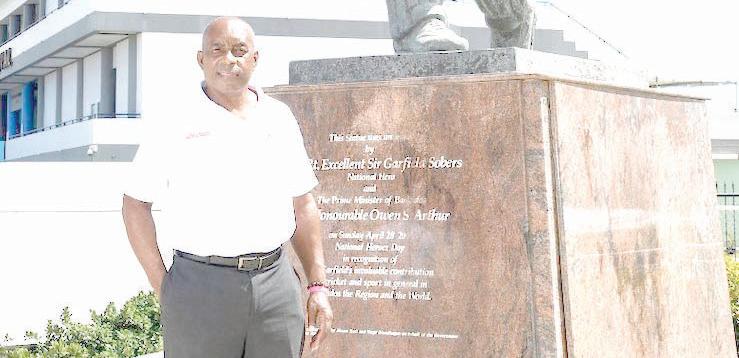
Young Warriors Cricket Club is where prolific batsman Shimron Hetmyer started playing cricket, and this club has also produced former Guyana and current USA batsman Gajanand Singh, whose brother Ishwar Singh, manager of GuyBiz, undertook this initiative with support from team members of Young Warriors Cricket Club, who handed over the hampers.
GuyBiz is a reputable procurement company. It is located in Berbice, but targets customers across the length and breadth of Guyana. Ishwar Singh is a former Senior Inter-County player and former national youth player.



The Young Warriors Cricket Club has produced many outstanding players during its years of existence. Other players who represented Berbice, Guyana, and the West Indies at different levels of competition are: Richard Ramdeen; former national captain Damodar Daesrath; Seon Hetmyer; Paul Wintz; Kwesi Maltay; Balram Samaroo; Alex Algoo; Kevin Ramdeen; Loaknauth
Ramsuchit; Kassim Khan; Linden Austin; Sanjay Khan; Shazad Khan; Ishwar Singh; Aaron Beharry; Anil Beharry; Suresh Dhanai; Farouk Hussain and Daryl Narine, among many others.
Young Warriors won the first and only Shapoorji Palonji National T20 competition played by defeating Blairmont CC. In the Neal and Massy National 40-Over Competition, this
club defeated the powerful Demerara Cricket Club in the final played at the Guyana National Stadium at Providence, EBD. And those are just some of the championship titles this club has.
This club has also won the GCB “Club of the Year” title for two consecutive years.
Banker Imran Saccoor is President of the Young Warriors Cricket Club.
In the spirit of Christmas, the Executive Committee of the Lusignan Golf Club is wishing everyone a happy holiday, and all the best in the New Year. The club notes that it is extremely grateful to its members, staff, and sponsors for a very successful 2022 season.
The message from the LGC notes: “We are encouraged by the progress made towards providing opportunities for kids and beginners of all ages to have free access to the golf course during the learning phases. The committee will continue to support these initiatives, which are designed to foster the growth of the game throughout Guyana and make golf accessible to anyone wishing to play. LGC also added several new members to our roster, and experienced increased interest in non-golf event bookings such as weddings, anniversaries, and other private functions from members and guests.
“Tournament golf is what drives LGC, and by any measure, this year was very successful. Our major tournament, the GTT GUYANA OPEN, had a capacity turnout for the second consecutive year. While we welcome all competitors, due to the limited number of slots available, we were forced to limit the field of players. We hope to increase the number of holes in the coming years
to be able to add to the number of participants in coming years.”
“The kids golf took a big step in the right direction with the inaugural Bruster’s Easter Sunday drive, chip and putt Fun Day. Kids from several areas stretching from Hopetown, Berbice to the mining town of Linden, came in large numbers to learn the game and the lessons of honesty and respect. Some of the participants further took advantage of the LGC’s invitation to continue their develop-
ing. These events are free to the kids, and are made possible due to all sponsorship support”.
The club also said the highly successful Guyana Open was followed by the MACORP Championship. This, it stated, is perhaps its second-most-attended tournament of the year.



For the club, it was seen that golfers, both local and international, played at both events.
The LGC also stressed the importance of its relationship with MACORP, which has a longstanding
hosting the 26-player contingent of Guyanese golfers, who were very successful at this year’s Suriname Invitational Golf Tournament, and looks forward to continued cooperation between the two countries in 2023 and beyond.
The LGC has vowed to have the Executive Committee continue to work to improve not only the great manicured fairways and greens that are essential to golf, but would also grow the game responsibly to upkeep the honourable spirit of the game of golf for all.
Site Seeing Tours, Bank of Baroda, Robert & Pandit Ravi, Chet Bowling, Beacon Ministries, Genuine Auto Spares, STP Investment, Trophy Stall, Bruster’s Real Ice Cream, Banks DIH Ltd, Ansa McAl, BK Inc, IGBL,
Sankar’s Auto Spares, Romel and Robin, Atlantic Energy, C&V Shipping, GTT and MACORP for making 2022 possible, and looks forward to their continued support,” the LGC message has noted.
West Indies Women have slumped to their lowest total in T20Is, while England completed a 5-0 whitewash over them in the five-match series with an eight-wicket win in Bridgetown.
England took only 16.2 overs to bowl West Indies out, with Freya Davies and Alice Davidson-Richards
ment beyond the fun day by scheduling free practice throughout the year.
“A second one-week Kids Summer Camp was held, which also saw a large diversity of kids participat-
partnership with the club, and continues to play an important role in the club’s development.
Further, it acknowledged the Paramaribo Golf Club in Suriname for
To date, the club has hosted 29 tournaments for calendar year 2022, with 20 being sponsored tournaments and 9 being club tournaments. There are, also, three sponsorship tournaments that would end activities for 2022, namely: Top Brandz, Deme Life and Survival Supermarket.
“The Lusignan Golf Club would like to thank Crown Mining, Odyssey

each taking three wickets, while Charlie Dean chipped in with two. In response, England reached the target of 44 in quick time, wrapping up the game inside the powerplay in 5.3 overs.
West Indies chose to bat in search of a maiden win in the five-match series, but after an uneventful
first over, they lost wickets in each of the next three overs, and one more inside the powerplay.
Davies made breakthroughs with the dismissals of Hayley Matthews and Rashada Williams, while Nat Sciver and Issy Wong accounted for Aaliyah Alleyne and Shabika Gajnabi respectively. Dean then removed middle-order batters Trishan Holder and Kyshona Knight just after the powerplay, at which stage the West Indies were 24 for 6 in 9.1 overs.

That soon became 30 for 8 when DavidsonRichards picked off both Afy Fletcher and Djenaba Joseph – the top-scorer for West Indies with 11 – in the same over; and along with Davies cleaned up the tail to return combined figures of 6 for 7.
The England chase began with a 22-run partnership between Danni Wyatt and Sophia Dunkley. Both later fell, but Sciver finished the game with a flourish, hitting three
Pandit Balaji: He is an expert in clearing problems like: Marriage, love, relationship, business, jobs, court case, health, bring back loved ones, remove black magic. 100% guaranteed results and He has permanent suggestions and solutions for lifetime within 3-5 days. Contact +592 698-8091.
Pandit Hari Krishna: Are you suffering from love problems, relationship, Family, Children, wife and husband, business, jobs, lucky number, remove negative energy, bad luck, visa, health?
Pandit Hari Krishna gives you permanent suggestion and solution within 5 days. Contact +592 678 4062.
Astrology and Spiritual Healer Pt. Mohan: +592-692-1009 If there is any problem in your life, he will get the solution. Please contact spiritual healer, regarding health, love, business, husband and wife problems, etc. Address: Georgetown, Guyana.
Contact PANDITH JAYA for all kinds of problems. You will get solutions 100% guarantee. Call or WhatsApp +592 688-1569. Address Georgetown.

Sam Curran has broken Chris Morris's record (INR 16.25 crore) to become the most expensive buy at an IPL auction when Punjab Kings outbid five other teams to sign him for INR 18.50 crore (US$2.25 million approximately).
At that price, Curran is also the most expensive player in IPL history -- even more than retained players like Virat Kohli and KL Rahul -- and has been reunited with the franchise that first brought him into the IPL with an INR 7.2-crore bid in 2019.
England allrounder Curran was the Player of the Final and the Tournament at the 2022 T20 World Cup in Australia, and has, since September this year, taken 25 wickets in 14 T20s at an economy rate of 7.08. He has also improved his batting, especially against spin. In 31 T20 innings since 2020, he has an average of 27.07 and a strike rate of 154.69.
"Absolutely overwhelmed and incredibly humbled to receive that bid," Curran told Star Sports. "Punjab is where I did my debut season a few years ago… It will be very different, but I know the stadium at Mohali pretty well, and surely our team-mates will help me… Incredibly excited to come to India for this big opportunity. So many things running through my mind. At 9am this morning I was struggling to find a stream, it [the auction] wasn't on TV in England. I sat with my girlfriend and her dad to watch it. I actually turned my phone off because I thought I was behind, and didn't want to see any messages saying congrats. I saw the bids coming from Mumbai, then Chennai. Having played for Chennai earlier, it was cool to see them [bidding]", Sam Curran has declared.
Mumbai Indians went as far as INR 18.25 crore to try and line-up Curran alongside Jofra Archer, their other big-ticket England signing at the previous auction, but they were eventually outbid by Punjab, who had begun the auction with the second-largest purse. Shortly after failing to buy Curran, Mumbai got their hands on Cameron Green for INR 17.50 crore, making the 23-year-old Australian allrounder the second most expensive player in IPL auction history.
"I'm pinching myself that this has all happened. It's such a weird feeling watching an auction for yourself. I can't believe how nervous I was, and I was shaking like anything when the final call was confirmed," Green said. "I've always been a huge fan of the IPL, and it's going to be so cool to be a part of it. The Mumbai Indians are one of the powerhouses of the competition, so I feel very humbled to be joining them. I can't wait to get there next year."
Green's T20 stocks have risen significantly in the last six months. Not part of Australia's T20 World Cup squad initially, he was a last-minute inclusion after Josh Inglis picked up an injury while playing golf. Green attracted the attention of IPL team scouts in a big way after
a prolific T20I series in India this year, where he made 118 runs, including two half-centuries, at a strike rate of 214.54 at the top of the order. His ability to bat anywhere in the order and bowl at a lively pace went in his favour at the auction.
tion purse of INR 42.25 crore on back-to-back buys. This meant Sunrisers, who went as high as INR 14.75 crore to try and get Stokes, eventually missed out on a marquee allrounder.
Pooran takes home more than a million dollars again Nicholas Pooran began the year by becoming the most expensive West Indian ever sold at an IPL auction, and he broke that record again when Lucknow Super Giants spent INR 16 crore (US$2 million approx.) to buy him.


For a while, the fight for Pooran seemed to be a contest between Delhi Capitals and Rajasthan Royals, but once Super Giants swooped in with a bid nearing a million dollars, it became a twoteam race between them and Capitals.
cured Williamson's services at his base price of INR 2 crore. At Titans, Williamson will also be reunited with his one-time Sunrisers teammate Rashid Khan.
Having played just one IPL game so far in 2021 for Punjab Kings, Adil Rashid will hope for a happier second stint. At INR 2 crore, the England legspinner was a steal for Sunrisers, who may have perhaps been surprised at the lack of competition. A key member of England's T20 World Cup-winning squad, Rashid has an excellent wrong'un, bowls ripping legbreaks, and can bowl in the powerplay too. And he'll probably be among the most explosive batting options at
of players, and that's where Topley fit in really well. To get a high-quality performer like him adds strength to our squad."
Ben Stokes then became Chennai Super Kings' costliest signing in an auction at INR 16.25 crore, which also made him the joint-third most expensive player ever at an auction. Stokes will line up alongside MS Dhoni in the IPL once again, after a brief stint together at Rising Pune Supergiants.
Royal Challengers Bangalore and Rajasthan Royals also bid for Stokes, but it soon became clear that their limited budgets would be a constraint. Having come into the auction with INR 20.45 crore, Super Kings spent nearly 80% of their budget on Stokes alone. He is also a viable captaincy candidate as the franchise begins to explore the idea of succession planning after Dhoni.
Harry Brook also made a splash when Sunrisers Hyderabad staved off aggressive bidding from Rajasthan Royals to buy the England batter for INR 13.25 crore (US$1.6 million approx.), the most a franchise has paid to sign an overseas batter at an auction.
Brook, 23, is set to feature in his first IPL season following a breakout year in international cricket. Only two months ago in Pakistan -- his first international overseas trip -- Brook impressed with his power-hitting to win the Player-of-the-Series award, after hitting 238 runs at a strike rate of 163.01 in a T20I series that England won 4-3. Brook's superior record across all T20s in Asia -- 581 runs in 16 innings at a strike rate of 167.43 -- may have been an attractive proposition for teams. More recently, Brook put behind him a disappointing T20 World Cup campaign to blast three centuries in the three-Test series that England won 3-0 in Pakistan.
Having signed Brook, Sunrisers also went hard to secure opening batter Mayank Agarwal for INR 8.25 crore (US$1 million approx.), thereby spending nearly 51% of their auc-

Pooran has endured a mixed year, as far as his international career is concerned. He was named Kieron Pollard's successor as West Indies' T20I captain, but stepped down following a dismal T20 World Cup campaign in which West Indies failed to make it out of the first round after losses to Scotland and Ireland. He had a decent IPL 2022, though, being among the few notable performers in a disappointing season for Sunrisers. He made 306 runs, including two

No. 10.
Royal Challengers' new signing, Reece Topley, had missed out on England's T20 World Cup squad because of injury, but he had a run of impressive performances in the lead-up to the tournament.
Topley's height allows him to extract steep bounce even on docile surfaces, and he has the ability to move the ball both ways. With Josh Hazlewood's workload likely to be monitored, given Australia have potentially the World Test Championship final and Ashes coming up after the IPL, Topley is an excellent back-up option for Royal Challengers at a base price of INR 1.5 crore.
Having come into the auction with the smallest purse (INR 7.05 crore), Knight Riders patiently watched proceedings. They entered the bidding just once -- for South Africa batter Heinrich Klaasen -- as the other franchises snapped up the first 38 players.
Curiously, Knight Riders were willing to spend INR 2.4 crore on the uncapped Jammu & Kashmir allrounder Vivrant Sharma, who was eventually bought by Sunrisers.
They came alive when they made aggressive bids to get an Indian wicketkeeper, having let B Indrajith and Sheldon Jackson go. They eventually got in-form player N Jagadeesan for INR 90 lakh. Jagadeesan has been in the form of his life recently, having racked up a record five List A centuries last month.
After buying Jagadeesan, Knight Riders bought back allrounder Vaibhav Arora and tried hard to buy back fast bowler Shivam Mavi. Having released Mavi to free up INR 7.75 crore for this auction, Knight Riders went as far as INR 1 crore before bailing out. Mavi eventually went to the Titans for INR 6 crore.
talent in Jammu & Kashmir, one player -- Vivrant Sharma -- made a mark with his composure and shot selection against pace. On Friday, those impressions translated into an IPL contract for the 23-year-old allrounder when Sunrisers signed him for INR 2.6 crore, after he had been part of their camp as a net bowler for IPL 2022. In addition to his big hitting, Vivrant also bowls fast legbreaks and googlies.
Eight years ago, Mukesh Kumar was told he couldn't play cricket. He was anaemic, and the bone edema in his knees was supposed to make bowling impossible. Yet, he persevered, and made a mark in Bengal's competitive club circuit and also the Ranji team.
A stellar performance in 2019-20, when Bengal made the Ranji Trophy final, proved to be the turning point, as Mukesh built on his breakout season to earn an India A and a national call-up earlier this year. He was meant to come in as a replacement player in 2021 for RCB, but missed out after contracting COVID-19. Earlier this year, he was a net bowler for Delhi Capitals, and now he's part of their squad for a price of INR 5.5 crore, the second-highest amount spent on an uncapped Indian player this auction.
fifties, at an average of 38.25 and a strike rate of 144.33.
His power-hitting ability was most recently seen in the Abu Dhabi T10, where he was adjudged Player of the Tournament for his 345 runs, which came at an average of 49.28 and a phenomenal strike rate of 234.69.
The bargain buys Sikandar Raza broke an eight-year barren run when he became the first Zimbabwean to be bought at an IPL auction since Brendan Taylor in 2014. At his base price of INR 50 lakh, Raza could be a steal for Punjab, given the form he's been in. Raza was the top run-getter (219 at a strike rate of 147) and second highest wicket-taker (ten wickets) for Zimbabwe at the T20 World Cup.
"As a friend, I wish someone picks him," Hardik Pandya said with a laugh when asked about Kane Williamson at a press conference prior to India's T20I series against New Zealand last month. Now they will team up at Gujarat Titans, who se-
"We wanted to have a like-for-like replacement for Jason Behrendorff," RCB Head Coach Sanjay Bangar said. "We've kept tab on most of the left-armers available. Josh isn't going to be available for the first few games, so we looked at availability
Towards the end of the auction, KKR snapped up overseas allrounders Shakib Al Hasan and David Weise, and Bangladesh opener Litton Das to strengthen their squad.
At a trial held to scout for
There was a flurry of activity right at the end of the auction, as teams filled up slots with players during the accelerated phase. Delhi picked up South African batter Rilee Rossouw -- who was unsold earlier -- for INR 4.6 crore; KKR got Shakib, and Royals got Adam Zampa for INR 1.5 crore each. And England's Joe Root secured a maiden IPL contract -- also with the Royals -- at his INR 1 crore base price. (ESPN
Cricinfo)








